
Chinese New Year Greetings, Global China Academy Fellows’ Newsletter and GCA 2024 Annual Report
Dear colleagues and friends,
As the Year of the Snake 2025 slithers forward, we are delighted to take this opportunity to update you on our situation and activities.
Following the comprehensive report on Special Edition for the 10th GCA Anniversary (2013–2023) we have updated Global China Academy’s brochure to highlight A Decade of Achievement to be Associate Member of the Academy of Social Sciences Since 2014 and celebrating the 10th anniversary of the Global Century Press (GCP, UK Company No.: 08892970).
The year 2024 marks the beginning of GCA 2.0, with changes in governance structure and policy development as key priorities. These initiatives lay the foundation for GCA’s future decades. This Annual Report is based on information from the GCA Trustees’ Annual Return Report to the Charity Commission (1st April 2023 to 31st March 2024) and the GCA Fellows’ first half-year Newsletter for 2024. This Annual Report also serves as the second half-year Newsletter. Please follow the links to read more details.
- Global China Academy
- Global China Academy Fellowship
- Global Century Press
- The 9th Global China Dialogue
Click here to download 2024 report.
- Click here to visit 2023 report (Special Edition for the 10th GCA Anniversary: 2013–2023). Download report.
- Click here to visit the Chinese New Year Greetings and the GCA Annual Report for the year 2021–2022. Download report.
- Click here to visit the Chinese New Year Greetings for 2022.
- Click here to visit Chinese New Year Greetings and the GCA Annual Report for the year 2020–2021. Download report.
- Click here to visit Chinese New Year Greetings and the GCI Annual Report for the year 2019–2020. Download report.
- Click here to visit Chinese New Year Greetings and the GCI Annual Report for 2018–2019. Download report.
- Click here to visit Chinese New Year Greetings and the GCI Annual Report for 2017–2018. Download report.
- Click here to visit Chinese New Year Greetings and the GCI Annual Report 2016–2017. Download report.
- Click here to visit Chinese New Year Greetings and the CCPN Global Annual Report for 2015–2016. Download report.
- Click here to visit Chinese New Year Greetings and the CCPN Global Annual Report for 2014–2015. Download report.
- Click here to visit Chinese New Year Greetings and the CCPN Global Annual Report for 2013–2014. Download report.
Note: The early greeting newsletters and annual reports contain a large number of web links to the old website. These will be available after being updated.
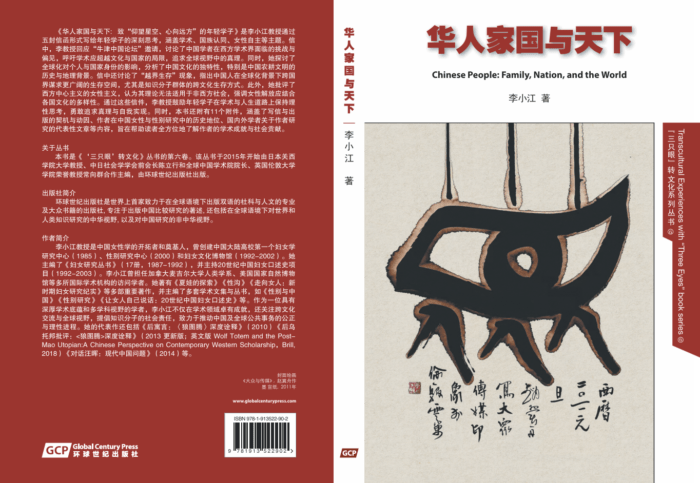
华人家国与天下——致“仰望星空、心向远方”的年轻学子
我们荣幸地宣布,由李小江撰写的《华人、家国与天下——致“仰望星空,心向远方”的年轻学子》(海外中文版)正式出版。
书籍信息
书名:华人、家国与天下——致“仰望星空,心向远方”的年轻学子(海外中文版)
系列名:三只眼转文化丛书,第6卷
作者:李小江
语言:中文(含英语信息)
出版社:环球世纪出版社(Global Century Press)
出版地:伦敦
页数:306页
书号:
ISBN 978-1-913522-91-9 (精装)
ISBN 978-1-913522-90-2 (平装)
ISBN 978-1-913522-92-6 (电子书)
DOI https://doi.org/10.24103/TETE6.cn.2024
本书凝聚了李小江深厚的学术思考与人生智慧,以书信的形式,与新一代青年学子展开跨世代对话,探讨家国情怀、文化认同与全球视野。诚邀全球读者共读,共同思考当代社会变迁中的知识与责任。
本书提要
本书是李小江教授写给年轻学子的五封信。作者以书信形式表达深刻思考,涵盖学术、民族认同、女性自主等主题。信中,李教授回应“牛津中国论坛”邀请,讨论了中国学者在西方学术界面临的挑战与偏见,呼吁学术应超越文化与国家的局限,追求全球视野中的真理。同时,她探讨了全球化对个人与国家身份的影响,分析了中国文化的独特性,特别是中国农耕文明的历史与地理背景。信中还讨论了“越界生存”现象,指出中国人在全球化背景下跨国界谋求更广阔的生存空间,尤其是知识分子群体的跨文化生存方式。此外,她批评了西方中心主义的女性主义,认为其理论无法适用于非西方社会,强调女性解放应结合各国文化的多样性。通过这些信件,李教授鼓励年轻学子在学术与人生道路上保持理性思考,勇敢追求真理与自我实现。
同时,本书还附有10个相关附件,涵盖了写信与出版的契机与动因、作者在中国女性与性别研究中的历史地位、国内外学者关于作者研究的代表性文章等内容,旨在帮助读者全方位地了解作者的学术成就与社会贡献。
作者简介
李小江教授,中国女性学的开拓者和奠基人。在中国大陆高校创建第一个妇女学研究中心(1985)、第一个性别研究中心(2000)、第一个妇女文化博物馆(1992-2002)、主编第一套“妇女研究丛书”(17册,1987-1992)并主持20世纪中国妇女口述史项目(1992-2003)。曾为加拿大麦吉尔大学人类学系、美国国家自然博物馆、美国东北大学历史系、美国哈佛大学费正清东亚研究中心、日本奈良女大访问学者,以及日本御茶水大学性别研究所特聘教授。李小江是一位具有深厚学术功底和多学科视野的学者。40多年前,她开创和引领了中国本土萌发的“妇女研究运动”,将国外女性主义理论引入中国,推动了妇女与性别研究的普及教育和学科建设,在国内外产生了广泛影响。著有《夏娃的探索》(1987)《性沟》(1989)《走向女人:新时期妇女研究纪实》(1995,日文版,《女性へ向かって》,秋山洋子 Yoko Akiyama 译,明石書店 Akashi Shoten, 1995)《女性/性别的学术问题》(2005)《女性乌托邦》(2016)《日本结》(2017)《历史的性别》(2024)等著作。主编的文集包括《外国女权运动文选》(1986)《华夏女性之谜:中国妇女研究论集》(1988)《中国妇女分层研究》(1991)《性别与中国》(1994)《生育:传统与现代化》(1997)《妇女研究运动:中国个案》(1997)等。她主编的丛书除了上述提及的,还包括“性别与中国”(1997-2000)、“性别论坛”(2000-2022)、“性别研究”2004-2008)、“让女人自己说话:20世纪中国妇女口述史”(4辑,2003)、《乾·坤:性别研究文史文献集萃》(2019-2024)等6套。
李小江还是一位具有深刻思想和高度社会责任感的知识分子,其理念超越学术界,强调跨文化交流与全球视野的重要性,主张知识分子的社会担当,以推动中国及全球公共事务的公正与理性进程。代表作如下:《后寓言:〈狼图腾〉深度诠释》(2010)《后乌托邦批评:<狼图腾>深度诠释》(2013 更新版;英文版 Wolf Totem and the Post-Mao Utopian:A Chinese Perspective on Contemporary Western Scholarship,Brill, 2018)《对话汪晖:现代中国问题——管窥中国大陆学术风向与镜像(1990—2011)》(2014),以及《华人家国与天下——致“仰望星空、心向远方”的年轻学子》(2024)。
目 录
序言
- 总序言 / 陈立行 常向群 . . . . . . . . . . . . . . . . . . . . . . . . . . . . . . . . . . . . . . . . . . . . . . iii
- 序言一 对中国女性思想家书信的反思——跨代交流中的时间、地点、人性与性别 / 叶玛丽 Maria Jaschok. . . . . . . . . . . . . . viii
- 序言二 缘起 / 唐凌. . . . . . . . . . . . . . xii
- 引信 . . . . . . . . . . . . . . xvii
第一封信:学术世界 (问学求真) . . . . . . . .1
- 学术偏见的背景 . . . . . . . . . . . . . . . . . . . . . . . . . . . . . . . . . . . . . . . . . . . . . . . . . . . . . 4
- 学术精神与理想的大学 . . . . . . . . . . . . . . . . . . . . . . . . . . . . . . . . . . . . . . . . . . . . . . . 8
- 多元视角与独立学术道路 . . . . . . . . . . . . . . . . . . . . . . . . . . . . . . . . . . . . . . . . . . . . 12
第二封信:国族天下(身份归属) . . . . . . . 18
- (地缘)国家的认定和(个人)身份归属的改变 . . . . . . . . . . . . . . . . . . . . . . . . . 18
- 血亲认同——族群认同——民族认同——国家认同 . . . . . . . . . . . . . . . . . . . . . . . 20
第三封信:问学长安(中国特产). . . . . . . . . . 31
- “天下”是一个典型的中国概念 . . . . . . . . . . . . . . . . . . . . . . . . . . . . . . . . . . . . . . . 31
- 是什么土、什么水、什么样的人情,最终选择了“长安”? . . . . . . . . . . . . . . . 35
- 中国的历史,安与不安,究竟哪个是常态? . . . . . . . . . . . . . . . . . . . . . . . . . . 40
第四封信:越界生存(生活方式). . . . . . . . . 47
- “越界生存”及中国人越界生存的历程与特征 . . . . . . . . . . . . . . . . . . . . . . . . . . . 47
- 全球比较视野中的越界生存中的挑战与学术界的独特性 . . . . . . . . . . . . . . . . . 50
- 个人越界生存的体验与女性的选择 . . . . . . . . . . . . . . . . . . . . . . . . . . . . . . . . . . . 58
第五封信:生为女人(自主选择). . . . . . . . . . 63
- 女性主义的批判与自我认知 . . . . . . . . . . . . . . .. . . . . . . . . . . . . . . . . . . . . . . . . . . . 63
- 女性历史与文化的多元视角 . . . . . . . . . . . . . . .. . . . . . . . . . . . . . . . . . . . . . . . . . . . 65
- 父权制与性别制度的思辨 . . . . . . . . . . . . . . . . . . . . . . . . . . . . . . . . . . . . . . . . . . . . 69
- 现代女性的自我实现与未来愿景 . . . . . . . . . . .. . . . . . . . . . . . . . . . . . . . . . . . . . . . 75
附录
1 给李小江教授的邀请函 / 李沐喆及第一封回信——何谓远方 / 唐凌 . . . . . . 78
2 开拓中国女性研究的人,不想当女性主义者/ 张月 . . . . . . . . . . . . . . . . . . . . 97
3 宁愿消失,也不随波逐流 / 杨瑞春 . . . . . . . . . . . . . . . . . . . . . . . . . . . . . . . . . 118
4 《我与妇女研究半世缘》前言 / 李小江 . . . . . . . . . . . . . . . . . . . . . . . . . . . . . 121
5 为中国女性研究破土、奠基、拓疆——李小江著述书目选编 / 素手春秋 . 125
6 “女性/性别研究”奠基工程——史料汇聚及场馆建设 / 李小江 . . . . . . . . 132
7 重审新时期——以李小江为例 / [美]王玲珍 . . . . . . . . . . . . . . . . . . . . . . . 139
8 20世纪80年代中日“妇女学/性别研究”本土化的比较考察 / 陈晨 . . . . . 167
9 李小江本质论女性主义的学术理论价值 / 畅引婷 杨霞 . . . . . . . . . . . . . . . . 185
10 将“现代”轻轻地揉进传统——读《独行的缪斯》/ 李小江 . . . . . . . . . . 209
环球世界出版社双语信息环球世界出版社双语信息
1 关于本书 . . . . . . . . . . . . . . . . . . . . . . . . . . . . . . . . . . . . . . . . . . . . . . . . . . . 224, 239
1.1 提要和作者 . . . . . . . . . . . . . . . . . . . . . . . . . . . . . . . . . . . . . . . . . . . . . 224, 239
1.2 部分文章提要与作者 . . . . . . . . . . . . . . . . . . . . . . . . . . . . . . . . . . . . . 225, 240
1.3 英文目录 . . . . . . . . . . . . . . . . . . . . . . . . . . . . . . . . . . . . . . . . . . . . . . . 225, 243
1.4 序言一(英文) . . . . . . . . . . . . . . . . . . . . . . . . . . . . . . . . . . . . . . . . . 225, 245
1.5 编后记(英文) . . . . . . . . . . . . . . . . . . . . . . . . . . . . . . . . . . . . . . . . . 225, 247
1.6 本系列丛书 . . . . . . . . . . . . . . . . . . . . . . . . . . . . . . . . . . . . . . . . . . . . . 225, 255
2 更多来自本社 . . . . . . . . . . . . . . . . . . . . . . . . . . . . . . . . . . . . . . . . . . . . . . 227, 257
2.1 本社独有的特色 . . . . . . . . . . . . . . . . . . . . . . . . . . . . . . . . . . . . . . . . . . . 227, 257
2.2 本社以全球和转文化视野创造了双语服务的独有特色 . . . . . . . . . . . 228, 257
2.3 本社汉英双语显示体例 . . . . . . . . . . . . . . . . . . . . . . . . . . . . . . . . . . . . . 229, 258
2.4 本社中文姓名英文显示体例 . . . . . . . . . . . . . . . . . . . . . . . . . . . . . . . . . 230, 259
2.5 本社系列丛书例举 . . . . . . . . . . . . . . . . . . . . . . . . . . . . . . . . . . . . . . . . . 231, 260
2.6 本社期刊和辑刊系列 . . . . . . . . . . . . . . . . . . . . . . . . . . . . . . . . . . . . . . . 233, 262
编后记 李小江的学术遗产及其多维度的全球影响 / 常向群
评论
本书展现了思想交流的力量,呈现了一场跨世代女权主义者之间罕见的对话。《书信集》是一部发人深省的作品,揭示了时间与环境的变迁如何塑造知识表达和社会意义。在这封信件往来中,李小江与唐凌展开了一场既亲密又严谨的思想探索,深入探讨了女权主义思想、自我表达以及个人与政治之间的互动关系。她们的交流展现了学术研究如何受历史变迁与个人发展轨迹的影响,提供了关于性别化社会资本、限制与机遇的深刻见解。
本书引导读者反思女权主义话语的演变、跨文化交流以及跨国知识互动的挑战。它突出了思想慷慨与批判性求知如何促进知识共享和自我反思,鼓励读者深入审视意识形态、身份认同与行动力之间的交织关系。写作本身成为一种探索的行为,在这一动态过程中,作者们协商意义、剖析道德困境,并表达对公平与正义的愿景。
通过记录她们不断发展的观点,《书信集》强调了思想对话在塑造女权主义学术研究和推动社会变革中的重要性。这是一本极具价值的著作,帮助读者理解全球框架下中国女性知识分子的现实处境。
选自《序言一》,叶玛丽 Maria Jaschok
本书展现了李小江作为学者、独立知识分子和批判性思想家的深远影响。它凝练了她在中国妇女与性别研究领域的开创性贡献,呈现了她的丰硕研究成果、跨学科视角以及对知识独立的不懈追求。通过她广泛的学术著作,塑造了中国的女权主义话语,强调本土知识与全球理论的批判性对话。
本书收录的书信与附录既是历史记录,也是思想反思,使读者能够领略李小江学术研究的广度和深度。她的写作风格融入了探索精神,使作品既严谨又富有启发性,在学术规范与个人思考之间搭建起一座桥梁。她的批判性思维不仅限于女权主义,还涉及政治哲学、历史叙事以及跨文化对话,提供了独特的洞见。
此外,本书强调了她独立的学术道路,她常常选择与主流潮流保持距离,拒绝随波逐流,而是坚持自我反思和思想自主。正是这种独立精神,使她在当代思想界独树一帜。本书不仅保存了她的思想遗产,也激励后人投身批判性研究,坚守独立学术精神。
选自《编后记》,常向群
- 点击这里浏览英文网页

Chinese People: Family, Nation, and the World
We are pleased to announce the official publication of the book Chinese People: Family, Nation, and the World — Letters to Young Scholars: “Looking Up at the Stars, Reaching for the Horizon” (Overseas Chinese Edition) by LI Xiaojiang, published by Global Century Press (London), 2024. pp.306.
Book Information
Title: Chinese, Homeland, and the World—Letters to Young Scholars Who “Look Up at the Starry Sky and Strive for the Distant Future” (Overseas Edition)
Series: Three Eyes Transcultural Studies Series, Vol. 6
Author: LI Xiaojiang
Language: Chinese (with English information)
Publisher: Global Century Press
Publication Location: London
Pages: 306
ISBN Numbers:
- Hardcover: ISBN 978-1-913522-91-9
- Paperback: ISBN 978-1-913522-90-2
- Ebook: ISBN 978-1-913522-92-6
🔗 DOI: https://doi.org/10.24103/TETE6.cn.2024
About the book
This profound work, written in the form of five letters to young scholars, explores themes such as academia, national identity, and women’s autonomy. In these letters, Professor Li responds to an invitation from the Oxford China Forum, addressing the challenges and biases faced by Chinese scholars in Western academia. She calls for academia to transcend cultural and national boundaries, advocating for the pursuit of truth from a global perspective. At the same time, she examines the impact of globalization on both personal and national identities, offering an in-depth analysis of the uniqueness of Chinese culture—particularly within the historical and geographical context of Chinese agrarian civilization. The letters also explore the phenomenon of ‘border-crossing survival,’ highlighting how Chinese people, especially intellectuals, seek broader living spaces beyond national borders in the context of globalization and adopt cross-cultural ways of existence. Furthermore, Professor Li critiques Western-centric feminism, arguing that its theories are not universally applicable to non-Western societies. She emphasizes that women’s liberation should consider the cultural diversity of different countries. Through these letters, Professor Li encourages young scholars to uphold rational thinking in both their academic and personal journeys, and to bravely pursue truth and self-realization.
Additionally, the book includes 10 related appendices, covering the circumstances and motivations behind the writing and publication of the letters, the author’s historical position in the field of Chinese women’s and gender studies, and representative articles by domestic and international scholars about the author’s research. These appendices aim to provide readers with a comprehensive understanding of the author’s academic achievements and social contributions.
About the author
Professor LI Xiaojiang is a pioneer and foundational figure in Chinese women’s studies. She established the first Women’s Studies Research Centre (1985), the first Gender Studies Centre (2000), and the first Women’s Cultural Museum (1992-2002) at universities in mainland China. She also served as the chief editor of the first ‘Women’s Studies Series’ (17 volumes, 1987-1992) and led the 20th-century Chinese Women’s Oral History Project (1992-2003). She has been a visiting scholar at McGill University’s Department of Anthropology in Canada, the National Museum of Natural History in the United States, the Department of History at Northeastern University in the United States, Harvard University’s Fairbank Center for Chinese Studies, the Nara Women’s University in Japan, and a distinguished professor at the Gender Studies Institute of Ochanomizu University in Japan.
LI Xiaojiang is a scholar with a deep academic foundation and a multidisciplinary perspective. Over four decades ago, she pioneered and led the ‘Women’s Studies Movement’ that emerged in China, introducing feminist theories from abroad and promoting the popularization of women’s and gender studies education, as well as the development of these academic disciplines in China. Her work has had a wide-reaching impact both domestically and internationally. Her notable works include Exploring Eve (1987), Sexual Divide (1989), Toward Women: A Documentary on Women’s Studies in the New Era (1995, Japanese edition 女性へ向かって, translated by Yoko Akiyama, Akashi Shoten, 1995), Academic Issues in Women/Gender Studies (2005), Women’s Utopia (2016), The Knot of Japan (2017), and The Gender of History (2024), among others. LI Xiaojiang has also edited a number of important volumes, including Selections from Foreign Feminist Movements (1986), The Mystery of Chinese Women: Essays on Chinese Women’s Studies (1988), Research on the Stratification of Chinese Women (1991), Gender and China (1994), Reproduction: Tradition and Modernization (1997), The Women’s Studies Movement: The Chinese Case (1997), and others. In addition to the series mentioned above, she has also edited six other series, including ‘Gender and China’ (1997-2000), ‘Gender Forum’ (2000-2022), ‘Gender Studies’ (2004-2008), ‘Let Women Speak for Themselves: Oral History of Chinese Women in the 20th Century’ (4 volumes, 2003), and ‘Qian-Kun: A Collection of Gender Studies Historical and Literary Documents’ (2019-2024).
LI Xiaojiang is also an intellectual with profound thought and a strong sense of social responsibility. Her philosophy extends beyond academia, emphasizing the importance of cross-cultural exchange and a global perspective. She advocates for the social responsibility of intellectuals to promote justice and rational progress in public affairs both in China and globally. Her representative works include Post-Fable: A Deep Interpretation of Wolf Totem (2010), Post-Utopian Criticism: A Deep Interpretation of Wolf Totem (2013 Revised Edition; English edition Wolf Totem and the Post-Mao Utopian: A Chinese Perspective on Contemporary Western Scholarship, Brill, 2018), Dialogue with Wang Hui: Modern Chinese Issues—A Glimpse of Academic Trends and Mirrors in Mainland China (1990-2011) (2014), and Chinese People: Family, Nation, and the World — Letters to Young Scholars ‘Looking Up at the Stars, Reaching for the Horizon’ (2024).
Contents
- General Preface / Lixing Chen and Xiangqun Chang ………. vii
- Preface 1 / Maria Jaschok ………. ix
- Preface 2 Origin / Tang Ling ………. xii
- Fuses ………. xvii
- Background of Academic Prejudice 1
- The Spirit of Academia and the Ideal University 6
- Diverse Perspectives and Independent Academic Pathways 8
- The Recognition of (Geopolitical) Nations and Changes in (Personal) Identity 13
- Kinship Identity — Ethnic Identity — National Identity 24
- “天下” (The World) as a Typical Chinese Concept 35
- What Soil, What Water, and What Kind of Human Affection Ultimately Chose “Chang’an”? 45
- Chinese History: Stability and Instability, Which One is the Norm? 53
- “Border-Crossing Survival” and the History and Characteristics of Chinese Border-Crossing Survival 64
- Challenges in Border-Crossing Survival from a Global Comparative Perspective and the Uniqueness of Academia 71
- Personal Experiences of Border-Crossing Survival and Women’s Choices 76
- Critique of Feminism and Self-Awareness 1
- Multiple Perspectives on Women’s History and Culture 6
- Patriarchy and the Gender System: Reflections 8
- Self-Realization of Modern Women and Future Visions 8
- Invitation Letter to Professor LI Xiaojiang / LI Muzhe; The First Reply Letter – What is Far Away / Ling Tang, President of the British Postgraduate Network for Chinese Studies………. 78
- The Person Who Pioneered Chinese Women’s Studies Doesn’t Want to Be a Feminist / ZHANG Yue……. 97
- I’d Rather Disappear Than Follow the Crowd / YANG Ruichun………. 118
- Foreword to My Half-Century Connection with Women’s Studies / LI Xiaojiang ………. 121
- Breaking Ground, Laying the Foundation, and Expanding Horizons for Chinese Women’s Studies — A Selection of Li Xiaojiang’s Works / SU Shouchun ………. 125
- The Founding Project of ‘Women/Gender Studies’ — Compilation of Historical Materials and Venue Construction ……….132
- Re-examining the New Era — The Case of Li Xiaojiang / [U.S.] Lingzhen Wang ………. 139
- A Comparative Study of the Localization of “Women’s Studies / Gender Studies” in China and Japan in the 1980s / CHEN Chen ……….167
- The Academic Theoretical Value of LI Xiaojiang’s Essential Feminism / CHANG Yiting, YANG Xia ……….185
- Gently Weaving the ‘Modern’ into Tradition — A Reading of The Muse Who Walks Alone / LI Xiaojiang………. 209
Reviews
This book exemplifies the power of intellectual exchange, offering a rare dialogue between feminists across generations. The Letters is a revelatory collection that illuminates how contingencies of time and place shape intellectual expression and social significance. Through this correspondence, LI Xiaojiang and Tang Ling engage in an intimate and rigorous exploration of feminist thought, self-expression, and the interplay of personal and political dimensions. Their exchange demonstrates how scholarship is shaped by historical shifts and individual trajectories, offering profound insights into gendered social capital, constraints, and opportunities.
This work invites readers to reflect on the evolution of feminist discourse, cross-cultural encounters, and the challenges of transnational intellectual engagement. It highlights how intellectual generosity and critical curiosity foster knowledge-sharing and self-reflexivity, empowering readers to examine the intersections of ideology, identity, and agency. Writing itself emerges as an act of discovery, a dynamic process through which the authors negotiate meaning, probe moral ambiguities, and articulate visions for justice and equity.
By chronicling their evolving perspectives, The Letters underscores the importance of intellectual dialogue in shaping feminist scholarship and broader social transformation. It is an invaluable contribution to understanding the lived realities of Chinese women intellectuals within a global framework.
Summarised from Preface one, by Maria Jaschok
This book highlights LI Xiaojiang’s profound impact as an academic scholar, independent intellectual, and critical thinker. It encapsulates her pioneering contributions to Chinese women’s and gender studies, showcasing her prolific research, interdisciplinary insights, and unwavering commitment to intellectual independence. Through her extensive body of work, she has shaped feminist discourse in China, emphasizing local knowledge and critical engagement with global theories.
The book’s collection of letters and appendices serves as both a historical record and an intellectual reflection, allowing readers to appreciate the depth and breadth of LI Xiaojiang’s scholarship. Her literary style, infused with a spirit of inquiry, makes her work accessible yet thought-provoking, bridging academic rigor with personal reflection. Her critical thinking extends beyond feminism, offering insights into political and philosophical debates, historical narratives, and cross-cultural dialogues.
Furthermore, the book underscores her independent approach to scholarship, which often diverged from mainstream trends. Her refusal to follow prevailing ideological currents and her emphasis on self-reflexivity and intellectual autonomy make her a unique figure in contemporary thought. This work not only preserves her intellectual legacy but also inspires future generations to engage in critical inquiry and uphold the spirit of independent scholarship.
Summarised from Postscript, by Xiangqun Chang
- Click here to view the Chinese page
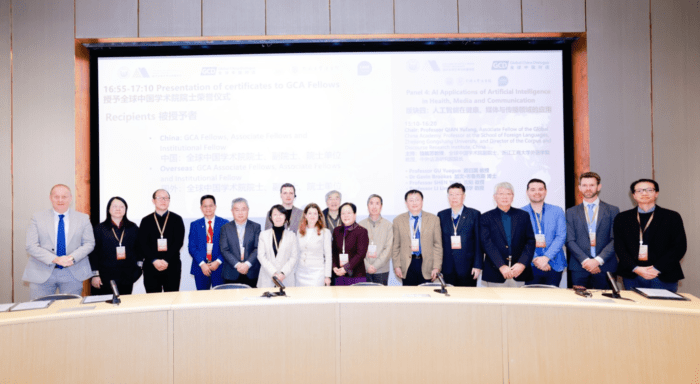
GCA Fellowship awards ceremony in 2024
The GCA Fellows Awarding Ceremony took place during the Closing Session of the 9th Global China Dialogue on 29th November. The session was chaired by Professor WANG Xin, Associate Fellow of the Global China Academy, Head of the Department of Communication at the College of Arts and Media, and Director of the Research Centre for Chinese Discourse and Global Communication at Tongji University. The Fellowship Awards Presentation was followed by a brief introduction to the Global China Academy (GCA) and its Fellowship system by Professor Xiangqun Chang FRSA FGCA, President of the Global China Academy, UK.

All Fellows, Associate Fellows, and representatives of Institutional Fellows in China were invited onstage to witness the conferral of honours upon the 2024 Fellows. Among those present as witnesses were existing Fellows (listed in alphabetical order): BING Zheng, Xiangqun Chang, GU Yueguo, HAO Shiyuan, LI Linxue, Tony McEnery, XIE Lizhong, ZHANG Xiaodong, and ZHU Guanglei, as well as Associate Fellows Gavin Brookes, QIAN Yufang, and WANG Xin. Representatives of Institutional Fellows also attended from the College of Arts and Media, Tongji University (China); the Centre for Corpus Approaches to Social Science, Lancaster University (UK); Global Century Press (UK); and the Institute of Linguistics, Sun Yat-sen University (China).
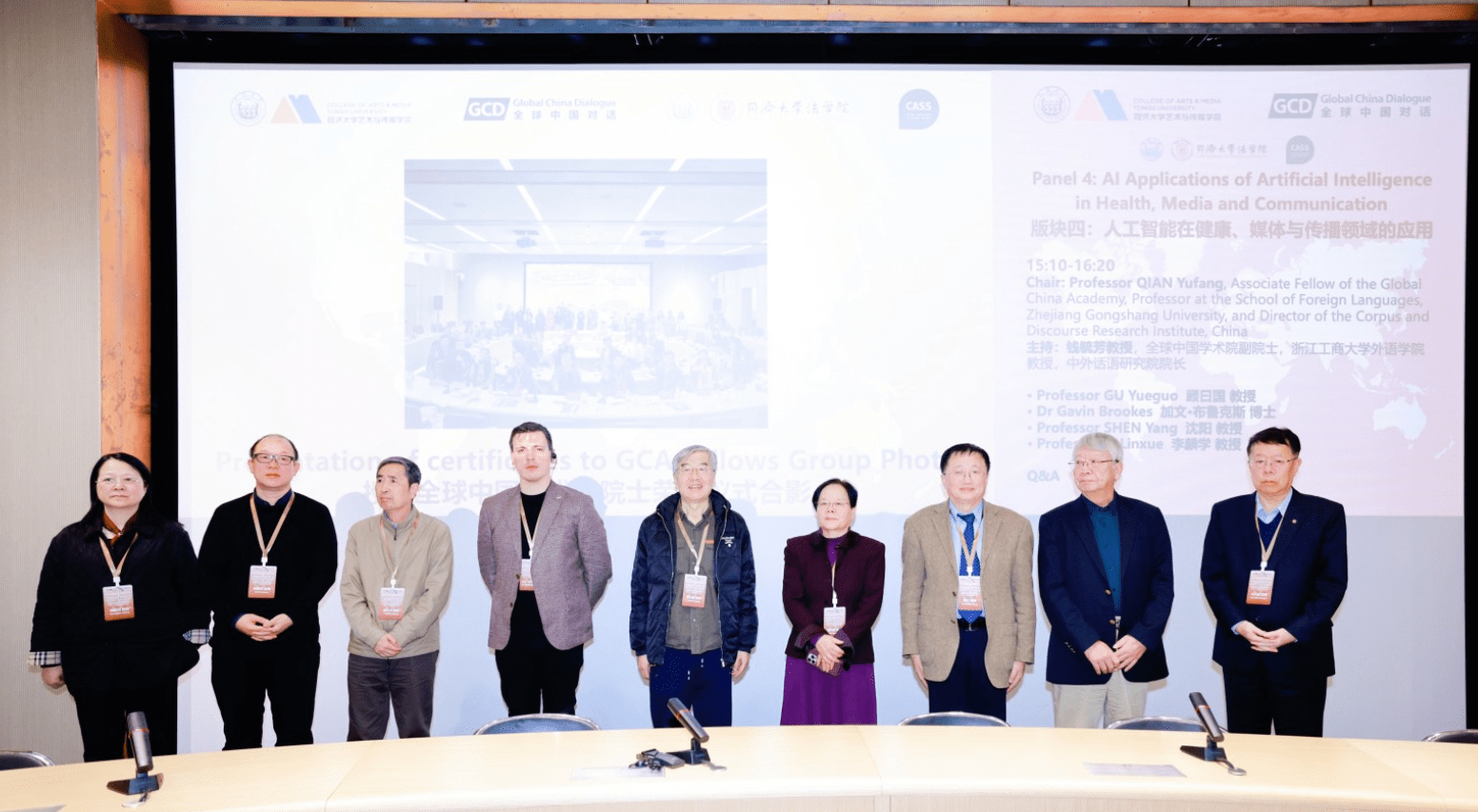
Professor HAO Shiyuan FGCA, Academician and former Assistant President of the Chinese Academy of Social Sciences (CASS), presented Fellowship awards to the newly elected GCA Fellows, Associate Fellows and Institutional Fellow based in China, including Hong Kong.
GCA Fellows:

Professor LI Yang (left), recipient of GCA Fellowship. He is Academician of the Chinese Academy of Social Sciences and Academician of the International Eurasian Academy of Sciences, as well as a former Vice President of the Chinese Academy of Social Sciences.
Professor Shuhua Zhou (right), recipient of GCA Fellowship. He is Chair Professor at City University of Hong Kong and a Fellow of the International Communication Association (ICA); former President of the Chinese Communication Association (CCA, 2017-2019) and Vice Chair of the Asia-Pacific Communication Alliance (ACPC, 2018-2025).
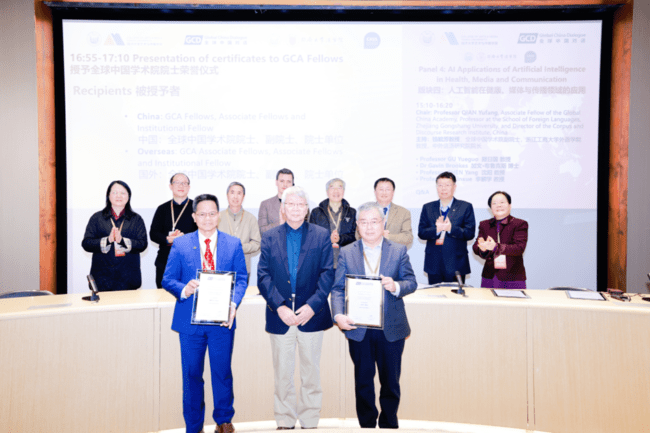
Associate Fellow and representative of Institutional Fellow (right):

Professor LI Boyi (left), recipient of GCA Associate Fellowship. He is Secretary of the GCA Chinese Council, is a Professor of Management at the School of Business Administration, Nanjing University of Finance and Economics. He was formerly a Fellow in the Information Systems and Innovation Group at the London School of Economics and Political Science (LSE).
Professor QIAN Yufang (right) attended as a representative to receive the certificate for the GCA Institutional Fellowship, which she led. She is an Associate Fellow of the Global China Academy and a Professor at the School of Foreign Languages, Zhejiang Gongshang University. She is also the Director of the Institute of Corpus Linguistics and Discourse Studies (ICLDS), which has been recognized as an Institutional Fellow.
The photo below shows the ICLDS team joining her to receive the honour.
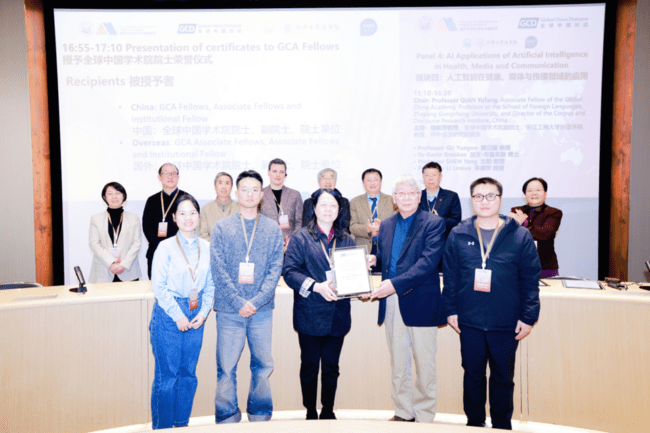
Professor XIE Lizhong FGCA, Chinese President of the Global China Academy, former Head of the Department of Sociology at Peking University, and former Vice-President of the China Sociological Association (CSA), presented Fellowship awards to the newly elected GCA Fellows, Associate Fellows, and Institutional Fellows based overseas.
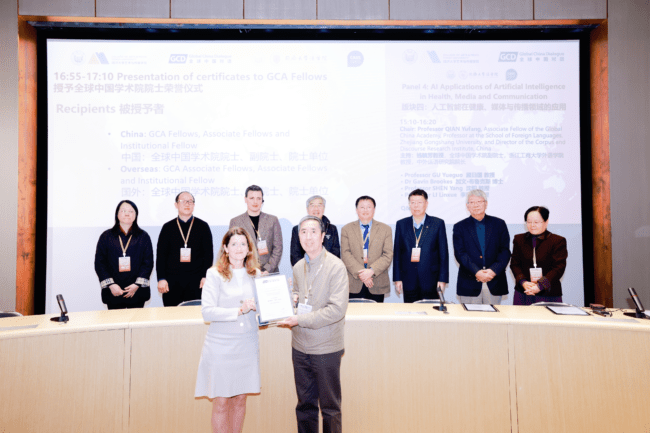
Professor Madeline Carr, recipient of GCA Fellowship, is Professor of Global Politics and Cybersecurity at University College London, as well as Co-Director of the interdisciplinary Centre for Doctoral Training in Cybersecurity and Deputy Director of the REPHRAIN Protecting Citizens Online research hub.
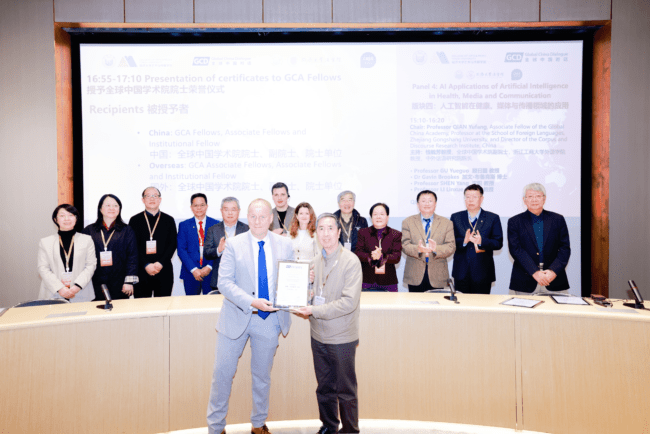
Mr Ian Stafford, recipient of GCA Fellowship, is founder of the UK’s first internet sports magazine, Sportsvibe, and The Sporting Club. He is a multiple award-winning British sportswriter, journalist, and broadcaster, has published 23 books, with his works widely circulated not only in the UK but also in countries like the USA, Canada, Australia, and South Africa.

- Dr Niall Curry FRSA SFHEA (left), recipient of the GCA Associate Fellowship, Senior Lecturer in TESOL and Applied Linguistics within the Department of Languages, Information, and Communications at Manchester Metropolitan University, UK
- Mr. Ed Holroyd-Pearce (right), recipient of the GCA Associate Fellowship, is the co-founder and president of Virtual Internships in the UK. He has a rich background in the intersections of education, technology, entrepreneurship, and Asia.
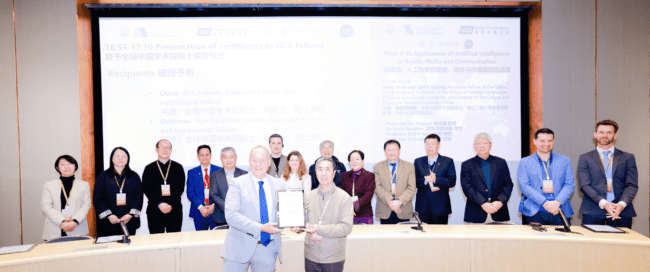
Mr. Ian Stafford attended as a representative to receive the certificate for the GCA Institutional Fellowship on behalf of The Sporting Club, which he founded.
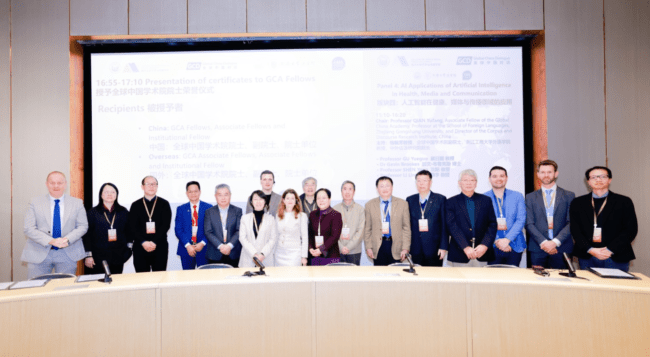
All the existing and newly awarded GCA Fellows, Associate Fellows, and representatives of Institutional Fellows gathered on the stage to celebrate their achievements and witness the formal conferral of honours, reinforcing the spirit of academic excellence and collaboration.
Awarding Fellowships on significant occasions helps showcase the remarkable achievements and academic authority of the recipients, enhances the influence and reputation of the academic institution, inspires future scholars to pursue excellence, and fosters broader societal appreciation and support for academic research.
Afterwards, a dinner was held at the Kingswell Hotel Tongji to celebrate the 9th Global China Dialogue, recognize the newly awarded GCA Fellowships, and provide an opportunity for absent speakers to share their views on the theme of GCD9: Global Governance for AI.
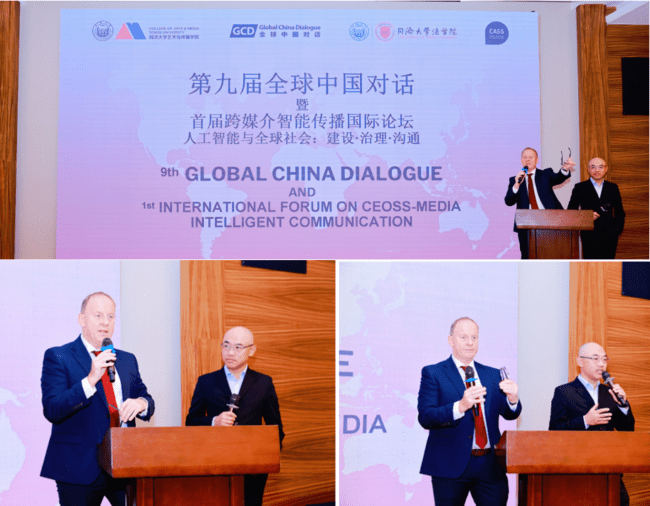
The newly awarded GCA Fellow, Ian Stafford, chaired the entire dinner session. We appreciated the professional chairship of this multiple award-winning British sportswriter, journalist, broadcaster, and event host. Kai Liang, Event Officer at Global China Academy and Director of Business Development at MEL Science, UK, served as the interpreter, demonstrating exceptional clarity and fluency in facilitating communication. Their contributions ensured a smooth and enjoyable evening for all attendees. The event fostered a lively and engaging atmosphere, strengthening connections among participants.
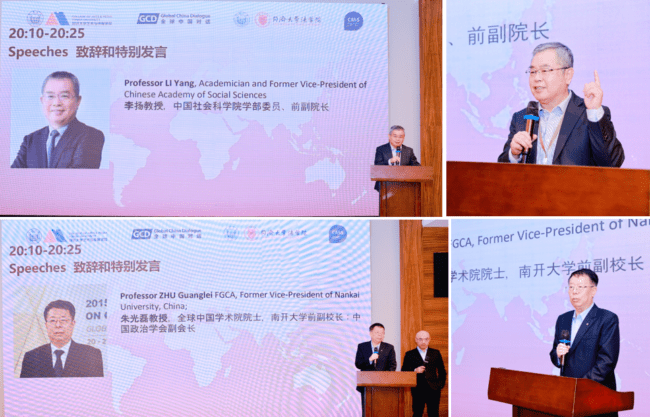
The newly awarded GCA Fellow, Professor LI Yang (top), expressed that it is a lifelong honour to become a GCA Fellow. From a social scientific perspective, he reviewed global development historically in three stages and discussed its evolving trends. His insights enriched the evening, adding a thought-provoking dimension to the celebration.
The GCA Life Fellow, Professor ZHU Guanglei (bottom), expressed his happiness at seeing the growing number of GCA Fellowships and the steady development of GCA. He encouraged academics from universities to contribute by utilizing GCA’s platform to advocate for their research, promote scholarly exchange, and facilitate the implementation of research findings for the betterment of society.

Professor CHEN Qiwei (left), Director of the Yangtze River Delta Fintech Research Institute at East China Normal University, leads a high-level think tank and a specialized platform integrating industry, academia, and research in the field of fintech. He is also the founder of the Asian Business School and Zhengjing Academy, as well as Asia Business Group and Asia Business Capital. Instead of briefly presenting his work, Empowering the Integration of Finance and the Real Economy in the AI Era, he left the PPT with us and shared his experiences across different fields, from academia to business and vice versa, both domestically and globally.
Dr Yuan Cheng (right), Trustee of the Board of Trustees, Global China Academy, is the Chair of Russell Reynolds Associates Greater China. She received her DPhil in Sociology from the University of Oxford. As a leadership advisor, she guides clients on senior-level leadership advisory assignments across industries and geographies, overseeing Russell Reynolds Associates’ operations in Beijing, Shanghai, Shenzhen, and Hong Kong. Two days before GCD9, she contracted a viral infection and lost her voice. Given the circumstances, the GCD9 Organising Committee decided to play her previously recorded video at the event, as its content remained highly meaningful and relevant to a diverse audience. In her speech, she emphasized that we are living in an extraordinary era marked by unprecedented environmental and geopolitical challenges. She stressed the urgent need for globally minded leaders who prioritize international collaboration and cross-cultural communication.
As with previous Global China Dialogue forums (GCDs) and other events worldwide, there have always been various reasons preventing invited speakers from attending, and GCD9 was no exception. To ensure that participants could still benefit from their insights, we decided to retain the titles and abstracts of absent speakers’ talks in our Programme Handbook, play their short video messages during dinner, and post their speech notes online. This approach aimed to maximize the value of the GCD9 experience for all attendees. We took these steps not only to acknowledge the valuable contributions of absent speakers but also to utilize our platform to disseminate their work and amplify its impact.
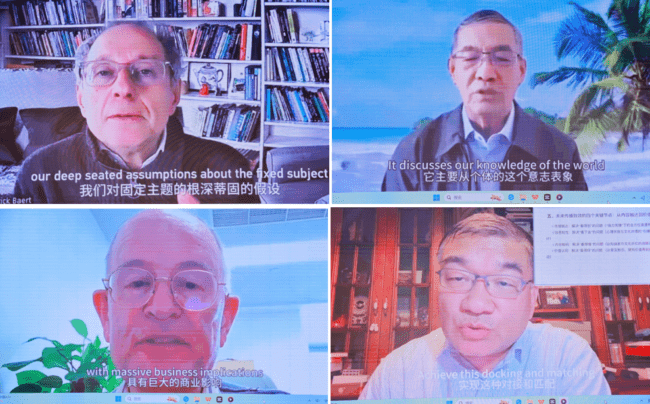
Professor Patrick Baert (top left), Professor of Social Theory at the University of Cambridge and a Fellow of Selwyn College, Cambridge, UK: ‘There is already a considerable amount of interdisciplinary research available on the impact of artificial intelligence on various aspects of society, from education to work. Personally, I am interested in some of the broader, more philosophical issues related to AI, particularly those concerning agency and authorship. For many centuries, across different cultures, we have been accustomed to the notion of a fixed subject—a human creator who is responsible for artistic, scientific, or literary works, and we have generally believed that the human agent behind these products could be clearly identified. However, this has not always been the case. In the past, human agency was often considered insignificant because religious or divine creative forces were seen as overriding everything else. For instance, the name of a painter was once regarded as unimportant, as their work was believed to be intimately connected with the sacred. Yet for centuries, we have operated under the assumption that we can reliably trace a human subject behind creative products. While some poststructuralist philosophers have questioned this notion, in practical terms, the idea of human authorship has remained largely unchallenged—until now. With the rapid advancements in AI, we are no longer able to identify a fixed subject in the way we once did. AI-generated art, AI-assisted scientific discoveries, and AI-supported writing all demonstrate how quickly our deep-seated assumptions about authorship and agency are being questioned. This shift has enormous implications—not only legal but also broader societal ramifications, fundamentally altering our understanding of creativity, ownership, and human identity in the age of artificial intelligence.’
Professor LIU Shaojie (top right), former Director of the Center for Sociological Theory and Methodology at Renmin University of China; Chair Professor at the School of Social and Political Sciences at Anhui University, China: ‘The advancements in intelligence, digitization, and networked technologies have profoundly impacted human society, particularly in China, leading to complex social transformations. From a sociological perspective, one of the key topics for current study should be the differentiation and conflict of representations in an intelligent society. The study of representations has a long intellectual tradition. Over two hundred years ago, Schopenhauer stated that “the world is our representation,” emphasizing individual representations shaped by will. Over a hundred years ago, Durkheim, from the perspective of social integration and solidarity, argued for the importance of collective representations. More recently, Mark Zuckerberg, from the perspective of digitization, artificial intelligence, and networking, has argued that digital representations can create an entirely new world—the Metaverse. These developments are widely acknowledged as profound and deeply impactful, marking significant transformations in our understanding of representation. I believe that representations directly govern human social behaviour. In the era of AI and digital technologies, representations have become exceedingly complex. Not only have individual, collective, and societal representations developed intricate interrelations, but other forms of representations—such as corporate, market, group, organizational, community, and governmental representations—are also interwoven, leading to numerous contradictions and complex conflicts. Since representations shape social behaviour, especially at the grassroots level, their governing role should not be underestimated. Their impact on social order, social integration, and stability presents highly complex challenges. Therefore, I believe that sociology should engage in deeper research in this field, integrating theoretical insights with contemporary transformations. I am confident that such research will yield valuable results and contribute to our understanding of these ongoing societal shifts. This is my humble reflection.’
Professor Martin Lockett (bottom left), professor in the Department of International Business and Management, former Dean of the Faculty of Business at the University of Nottingham Ningbo China: ‘AI is, of course, a hot topic with significant implications for business. However, it is also at what Gartner refers to as the “peak of inflated expectations” in its hype cycle model. A year or two ago, the Metaverse was widely discussed, but today, interest has significantly quieted down. We must take a realistic approach to AI, recognizing both its capabilities and limitations while identifying the best opportunities to create maximum benefits for business and society. For example, AI can help bridge language barriers, facilitate the transfer of expertise across disciplines, and, most importantly, when combined with human expertise, assist in identifying key issues, developing creative opportunities, analyzing trends, and enhancing communication clarity. This holds great potential for international business, as it enables clearer and more precise interactions. In my field of education, AI can provide personalized support for students, simulate real-world international business environments, and offer faster and more extensive feedback. However, we must also work together to address the key challenges AI presents, such as intellectual property rights, legal responsibility, and the ethical use of AI, ensuring transparency for users and maintaining high-quality data and training. Addressing these challenges requires a combination of creative thinking, personal responsibility, and cross-border collaboration. In conclusion, I am confident that you will explore these issues in greater depth during the conference.’
Professor YU Guoming (bottom right), Director of the Academic Committee of the School of Journalism and Communication and leads the Communication Innovation and Future Media Laboratory at Beijing Normal University, China: ‘I want to take this opportunity to share a simple yet fundamental perspective: any communication process, including international communication, must focus on four key communication nodes to be truly effective. The first key node is information accessibility—ensuring that information reaches the intended audience. This is essentially about channel alignment. In today’s complex media landscape, people rely on diverse channels to access information. If we want to convey a specific idea, viewpoint, or message to an audience, it must be aligned with the channels they use. Only by matching our communication channels with those of our audience can we ensure that our message reaches them. Once information reaches the audience, the second key issue is engagement—ensuring that people want to continue reading or watching. This is about relationship alignment. The content must resonate emotionally, align with the audience’s interests, and connect with their social relationships, personal benefits, or emotional experiences. Only when there is such a connection can the message hold their attention and create psychological resonance. This is similar to the concept of “trigger points” in advertising, where content must be designed to capture and sustain interest. After securing engagement, the third challenge is content decoding—ensuring that the audience understands the message. Communication is essentially an encoding and decoding process. When we create content, we encode it with meaning, while the audience deciphers it through their knowledge, information, and cultural background. If these backgrounds are not sufficiently considered during encoding, the audience may misinterpret the message, leading to cultural discounting or cognitive bias. Thus, cultural alignment is crucial to ensure that the audience can accurately reconstruct the intended meaning. Finally, even if people receive, engage with, and understand the content, there remains the fourth and ultimate challenge: value alignment. Effective communication must align with the practical, real-world concerns of society. When a message resonates with people’s values and is validated through their lived experiences, it becomes truly meaningful and useful. This is the only way communication can achieve its full impact—guiding beliefs, influencing practices, and driving meaningful action. In conclusion, for any communication process to be effective, it must successfully address these four alignment challenges: channel alignment (ensuring accessibility), relationship alignment (sustaining engagement), cultural alignment (ensuring comprehension), and value alignment (driving real-world impact). Only by addressing these four key nodes can we achieve deep and effective communication. Therefore, these factors should be carefully considered in both communication strategy and execution.’
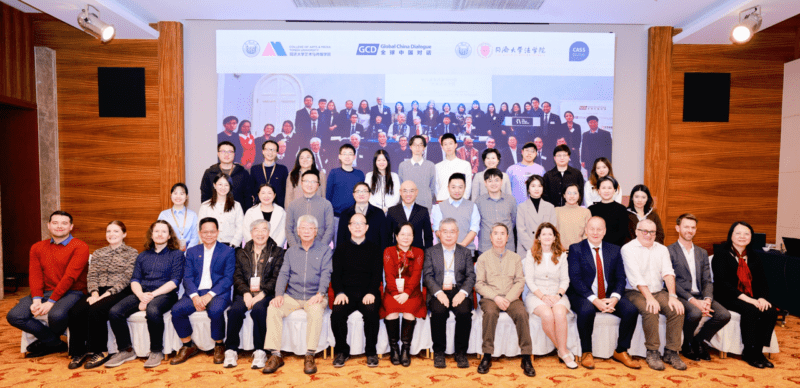
The GCA Fellows Awarding Ceremony was held on 29th November as part of the Closing Session of the 9th Global China Dialogue (GCD9), celebrating the achievements of newly appointed GCA Fellows, Associate Fellows, and Institutional Fellows. The event was chaired by Professor WANG Xin, with Professor Xiangqun Chang providing an overview of the GCA Fellowship system. Professors HAO Shiyuan and XIE Lizhong presented Fellowship awards to distinguished scholars from China, Hong Kong, and overseas, including Professor LI Yang (CASS), Professor Shuhua Zhou (City University of Hong Kong), Professor Madeline Carr (UCL), and sports journalist Ian Stafford.
A celebratory dinner at Kingswell Hotel Tongji, chaired by Ian Stafford with Kai Liang as interpreter, provided an opportunity for further engagement. Professor LI Yang reflected on global historical development, while Professor ZHU Guanglei highlighted the steady expansion of GCA Fellowships. Professor CHEN Qiwei shared insights into his fintech research and his interdisciplinary experiences bridging academia and business.
Several scholars delivered pre-recorded speeches, including Dr. Yuan Cheng on global leadership, Professor Patrick Baert (Cambridge) on AI’s impact on authorship, Professor LIU Shaojie on digital representations in AI-driven societies, and Professor Martin Lockett on AI in business and education. Professor YU Guoming emphasized the importance of four key communication nodes: channel, relationship, cultural, and value alignment.
The event reinforced GCA’s role in fostering academic excellence, promoting global collaboration, and advancing discussions on AI governance.

Celebrating GCA Fellowships and Concluding the 9th Global China Dialogue: Dinner Reception at Tongji
At the dinner celebrating the newly awarded GCA Fellowships and the conclusion of the 9th Global China Dialogue at Kingswell Hotel Tongji, the newly awarded GCA Fellow Ian Stafford chaired the entire dinner session. We greatly appreciated the professional chairship of this multiple award-winning British sportswriter, journalist, broadcaster, and event host. Kai Liang, Event Officer at the Global China Academy and Director of Business Development at MEL Science, UK, served as the interpreter, demonstrating exceptional clarity and fluency in facilitating communication. Their contributions ensured a smooth and enjoyable evening for all attendees. The event fostered a lively and engaging atmosphere, strengthening connections among participants.

The newly awarded GCA Fellow, Professor LI Yang (top), expressed that it is a lifelong honour to become a GCA Fellow. From a social scientific perspective, he reviewed global development historically in three stages and discussed its evolving trends. His insights enriched the evening, adding a thought-provoking dimension to the celebration.
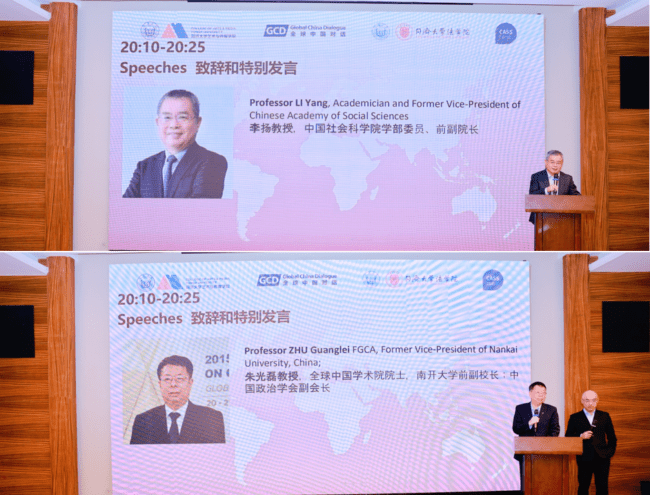
The GCA Life Fellow, Professor ZHU Guanglei (bottom), expressed his happiness at seeing the growing number of GCA Fellowships and the steady development of GCA. He encouraged academics from universities to contribute by utilizing GCA’s platform to advocate for their research, promote scholarly exchange, and facilitate the implementation of research findings for the betterment of society.
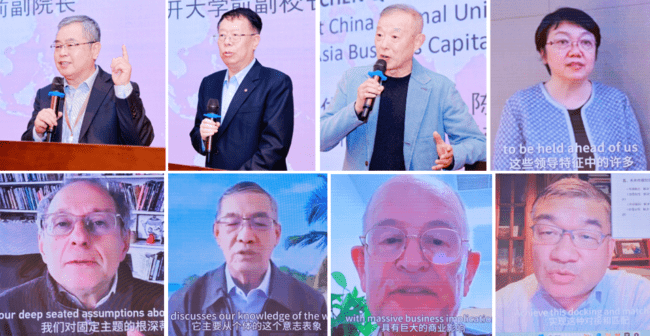
Other speakers, either present in person or absent, had their short video recordings with English and Chinese subtitles played. They are:
- Professor CHEN Qiwei (top second right), Director of the Yangtze River Delta Fintech Research Institute at East China Normal University, leads a high-level think tank and a specialized platform integrating industry, academia, and research in the field of fintech
- Dr Yuan Cheng (top right), Trustee of the Board of Trustees, Global China Academy, is the Chair of Russell Reynolds Associates Greater China.
- Professor Patrick Baert, Professor of Social Theory at the University of Cambridge and a Fellow of Selwyn College, Cambridge, UK
- Professor LIU Shaojie, former Director of the Centre for Sociological Theory and Methodology at Renmin University of China; Chair Professor at the School of Social and Political Sciences at Anhui University, China
- Professor Martin Lockett, former Dean of the Faculty of Business, professor in the Department of International Business and Management at the University of Nottingham Ningbo China.
- Professor Yu Guoming, Director of the Academic Committee of the School of Journalism and Communication and leads the Communication Innovation and Future Media Laboratory at Beijing Normal University, China
Click here to read their videos transcriptions.
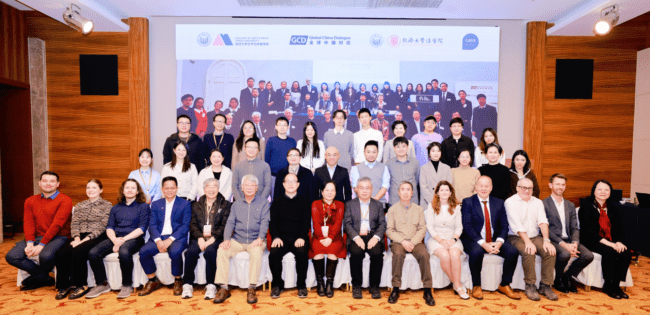
The 9th Global China Dialogue was held at Tongji University in Shanghai on November 29, 2024, marking the first time the event was hosted in China. The theme of this year’s event was ‘AI and Global Society: Building, Governance, and Communication,’ and it featured the First International Forum on Cross-Media Intelligent Communication. The conference included four panel discussions covering AI ethics, society building, global shifts in perceptions, and applications in fields such as health and media.
Keynote speakers included Professor Tony McEnery and Professor Jiang Huiling. The event also recognized outstanding contributions through GCA Fellowships and the Young Scholars’ Paper Award, and for the first time in China, a dinner reception was held to foster cross-cultural exchanges. This dialogue provided a new platform for international collaboration, focusing on the role of AI in shaping global society and communication.

The 9th Global China Dialogue was successfully held in Shanghai
The 9th Global China Dialogue is scheduled to take place on November 29, 2024, at Tongji University in Shanghai. This marks the first time the forum will be held in China, following the first eight sessions hosted at the British Academy in the UK.
According to the 2024 QS World University Rankings by Subject, Tongji University ranks first in China in the field of Data Science. The Shanghai Collaborative Innovation Center of Al Social Governance, based at Tongji University’s School of Law, will assist the College of Arts and Media in organizing this year’s Global China Dialogue. The theme of this dialogue is ‘AI and Global Society: Building, Governance, Communication’, which builds upon Tongji University’s existing strengths in AI research and incorporates global, societal, and media perspectives.
Adding ‘and the First International Forum on Cross-Media Intelligent Communication’ after ‘the 9th Global China Dialogue’ aims to enrich and deepen the theme of this event. Leveraging the high-level platform of ‘the 9th Global China Dialogue’, this addition incorporates perspectives on cross-media and intelligent communication to foster multidimensional discussions on global social governance and communication. It is expected to attract greater participation from both academia and industry, promote the integration of academic insights and practical applications and enhance the impact of the dialogue’s outcomes in the fields of international business and communication.
GCD IX and the First International Forum on Cross-Media Intelligent Communication will feature a series of diverse panels and discussions, bringing together experts from academia, technology, policy and business sectors. These panels will explore AI’s transformative role in various domains, including healthcare, the economy, ethics and international collaboration. The event will emphasize the ethical implications of AI, the importance of data privacy and the crucial balance between innovation and regulation. GCD IX will include the following four panels:
- Panel 1: Ethical Frameworks and Accountability in Artificial Intelligence
- Panel 2: Artificial Intelligence in Society Building and Governance
- Panel 3: Global Shifts in Perceptions and Attitudes in the AI Era
- Panel 4: Applications of Artificial Intelligence in Health, Media and Communication
The ‘Photo Report’ below will include links for viewing or downloading almost all the speech notes or PowerPoint presentations from the GCD9.
Friday, 08:30-17:00, 29 November 2023 at Tongji University
Opening session
Greetings
Chair: Professor LI Linxue FGCA, Dean of College of Arts and Media, Tongji University, China (left)

Speakers (from left to right):

- Professor ZHAO Qizheng, Dean of the School of Journalism at Renmin University of China, former Director of the State Council Information Office, and former Vice Mayor of Shanghai, China
- Professor Lü Peiming, Executive Vice President of Tongji University in China
- Professor WANG Lei, Professor at the School of Electronics and Information Engineering, Tongji University; Council Member of the Chinese Association for Artificial Intelligence; Secretary-General of the Shanghai Artificial Intelligence Society
- Professor Xiangqun Chang FRSA FGCA, President of Global China Academy; Honorary Professor of University College London (2015–20), UK
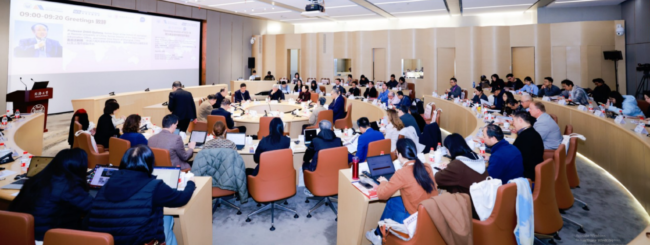
The photos below illustrate keynote speeches, panel discussions, and closing remarks at the 9th Global China Dialogue (GCD9). As in previous GCDs, the Closing Session includes a variety of functions, such as book launches. In this case, it features the Presentation of Certificates to GCA Fellows and the Presentation of the Young Scholars’ Paper Award, recognizing outstanding contributions and academic excellence.
Additionally, the reception and/or dinner sessions not only serve as social gatherings but also include important functions, further contributing to the integrity of the GCDs. While these sessions have been regular components of past GCDs in the UK, this marks the first time they are being hosted in China—a significant milestone that fosters deeper engagement among participants, facilitates cross-cultural academic exchange, and strengthens professional networks in a new context.
All presentation materials and related information will be added to each presentation for download, ensuring comprehensive documentation and accessibility for participants and stakeholders.
Keynotes speeches
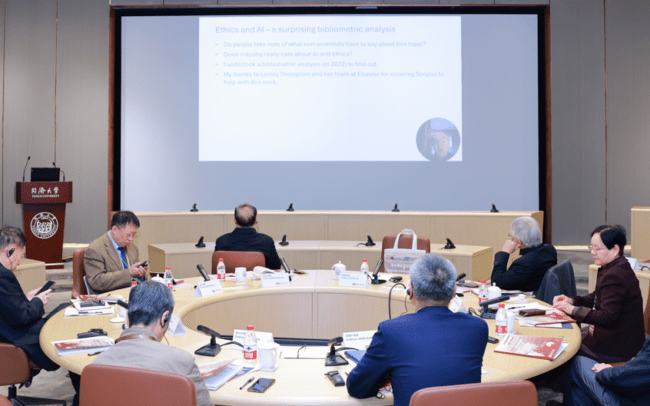
AI, Ethics and the Humanities in the UK, Professor Tony McEnery, Chair of Global China Academy Council; Distinguished Professor at Lancaster University, UK [pre-recorded]
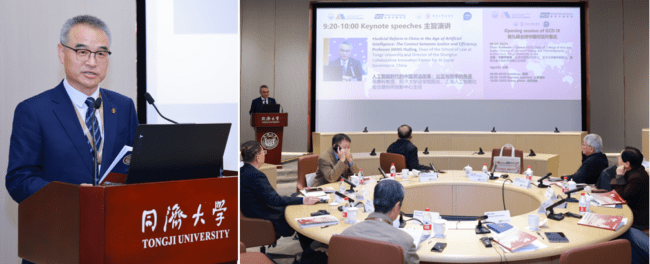
Judicial Reform in China in the Age of Artificial Intelligence: The Contest between Justice and Efficiency, Professor JIANG Huiling, Dean of the School of Law at Tongji University and Director of the Shanghai Collaborative Innovation Centre for AI Social Governance, China
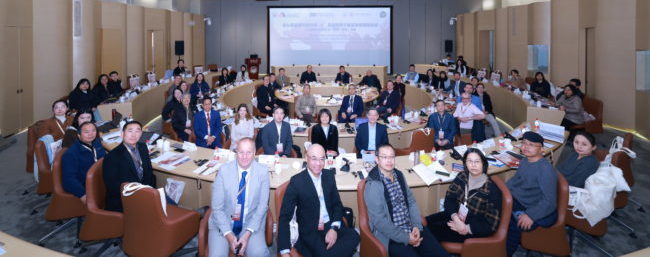
Group photo at the end of the Opening session.
Panel I: Ethical Frameworks and Accountability in Artificial Intelligence
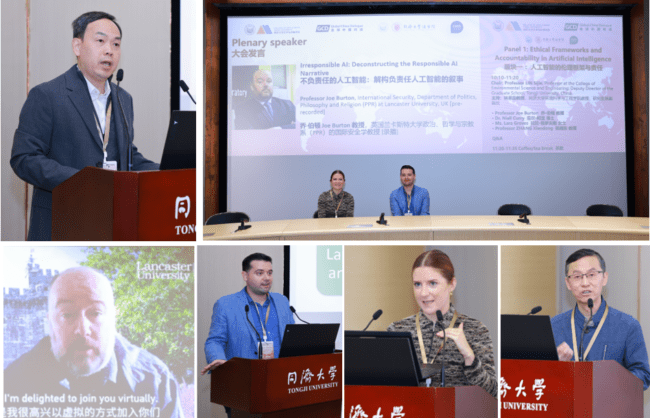
Chair: Professor LIN Sijie, Professor at the College of Environmental Science and Engineering; Deputy Director of the Graduate School, Tongji University, China
Plenary speakers (from left to right):
- Irresponsible AI: Deconstructing the Responsible AI Narrative, Professor Joe Burton, International Security, Department of Politics, Philosophy and Religion (PPR) at Lancaster University, UK [pre-recorded]
- Generative AI: Ethics, Reliability, and Representation, Dr Niall Curry FRSA SFHEA, Senior Lecturer in TESOL and Applied Linguistics within the Department of Languages, Information, and Communications at Manchester Metropolitan University, UK
- Auditing Work: Exploring the New York City Algorithmic Bias Audit Regime, Ms Lara Groves, Senior Researcher at the Ada Lovelace Institute, UK
- Smart Governance: Starting from the Logic of the ‘D-Industry’, Professor ZHANG Xiaodong FGCA and Non-Executive Chinese Chair of the Global China Academy in the UK; CEO of the Agile Think Tank; and Professor and former Director of the Innovation and Entrepreneurship Research Institute at Nanjing University of Finance and Economics, China
Panel II: Artificial Intelligence in Society Building and Governance
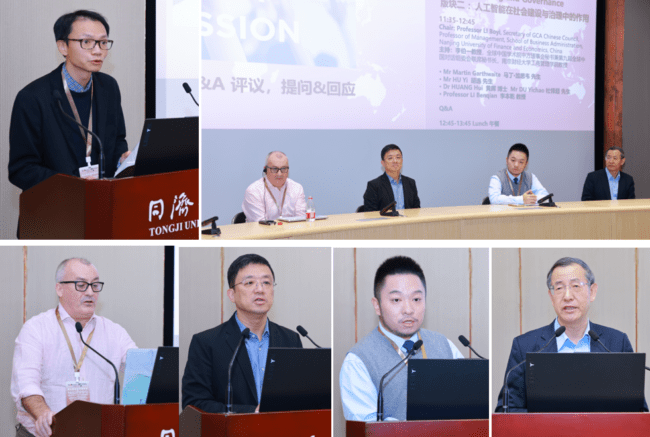
Chair: Professor LI Boyi, Secretary of GCA Chinese Council, Professor of Management, School of Business Administration, Nanjing University of Finance and Economics, China
Plenary speakers (from left to right):
- Governance in the Age of AI: Exploring New Paradigms, Mr Martin Garthwaite, Account Excellence Manager, Co-Chair of the Social Mobility Network PwC, UK
- The Wuxi Case of AI Empowering Modern Urban Governance, Mr HU Yi, Director of the Wuxi Municipal Data Bureau, China
- The Rise of Data-ism and the Digital Transformation of Urban Governance, Dr HUANG Hui, CEO of Shanghai Tianlv Software incorporated and the Honorary President of the Shanghai Information Society, and Mr DU Yichao, PhD Researcher at the Institute of Advanced Studies and Department of Anthropology at University College London, UK; Director of the Wuxi Institute of New Culture, China
- Ethical Evaluation and Governance of Generative AI (AIGC) Algorithms, Professor LI Benqian, Director and Distinguished Professor of the Institute of Intelligent Communication, Shanghai Jiao Tong University, China
Panel III: Global Shifts in Perceptions and Attitudes in the AI Era
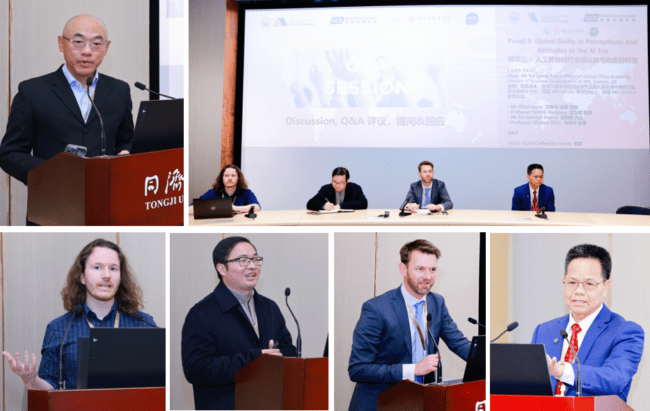
Chair: Mr Kai Laing, Event Officer of Global China Academy; Director of Business Development of MEL Science, UK
Plenary speakers (from left to right)
- Under the radar? Examining the evaluation of foundation models, Mr Elliot Jones, Senior Researcher at the Ada Lovelace Institute, UK
- The Evolution and Logic of Western Attitudes and Perceptions of China over the Past 200 Years – Analysis Based on AI Large Models and Internet Archive Data, Professor GONG Weigang, Director of the Media Big Data Research Centre at the School of Sociology, Wuhan University, UK
- AI-Driven Workplace Transformation and the Skill Development of Graduates, Mr Ed Holroyd-Pearce, Co-Founder and President of Virtual Internships, UK
- Artificial Intelligence or Human Anchors? Audience Perception of News Broadcasting, Professor Shuhua Zhou, Distinguished Chair Professor of Media and Communication at City University of Hong Kong, China
Panel IV: AI Applications of Artificial Intelligence in Health, Media and Communication
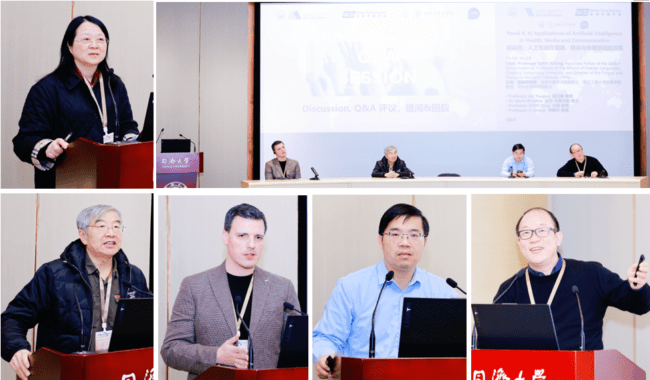
Chair: Professor QIAN Yufang, Associate Fellow of the Global China Academy, Professor at the School of Foreign Languages, Zhejiang Gongshang University, and Director of the Corpus and Discourse Research Institute, China
Plenary speakers (from left to right)
- The Multimodal Corpora of Gerontic Discourse in China: Theory and Practice, Professor GU Yueguo FGCA, Chief Expert of the Key Laboratory of Artificial Intelligence and Human Language, Beijing Foreign Studies University, China
- AI and Ideological Bias: A Case Study on Dementia Representation, Dr Gavin Brookes, Reader in Linguistics and a UKRI Future Leader Fellow with expertise in corpus linguistics, discourse analysis, and health communication at Lancaster University, UK
- AIGC and Human-Machine Symbiosis, Professor SHEN Yang, dual-appointed professor of School of Journalism and School of Artificial Intelligence, Director of the Metaverse Culture Lab and New Media Research Centre at Tsinghua University, China
- Cross-Media Art and Communication in the Age of Artificial Intelligence, Professor LI Linxue FGCA, Dean of College of Arts and Media, Director of Centre of Energy and Thermodynamic Architecture, Tongji University, China
Closing session
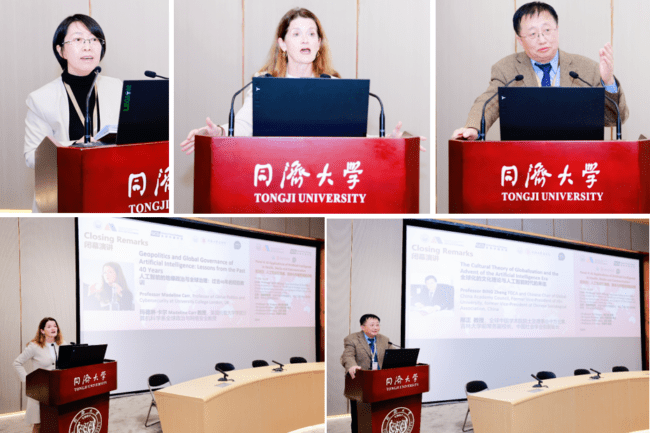
Chair: Professor WANG Xin (top left), Associate Fellow of Global China Academy, Head of Department of Communication, College of Arts and Media, Director of Research Centre for Chinese Discourse and Global Communication at Tongji University, China
Closing remarks:
- Geopolitics and Global Governance of Artificial Intelligence: Lessons from the Past 40 Years, Professor Madeline Carr, Professor of Global Politics and Cybersecurity at University College London, UK
- The Cultural Theory of Globalization and the Advent of the Artificial Intelligence Era, Professor BING Zheng FGCA and Chinese Chair of Global China Academy Council, Former Vice-President of Jilin University, former Vice-President of Chinese Sociological Association, China
Presentation of certificates to GCA Fellows
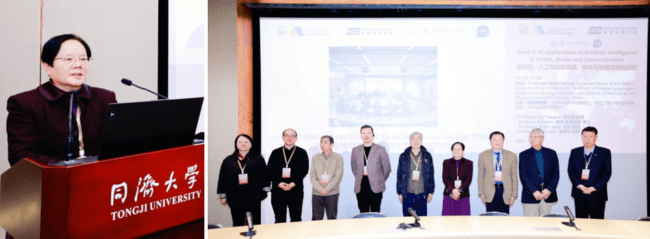
Introduction of GCA and the Fellowships: Professor Xiangqun Chang FRSA FGCA, President of the Global China Academy, Honorary Professor of University College London (2015-20), UK. All existing GCA Fellows and Associate Fellows in China were on stage as witnesses
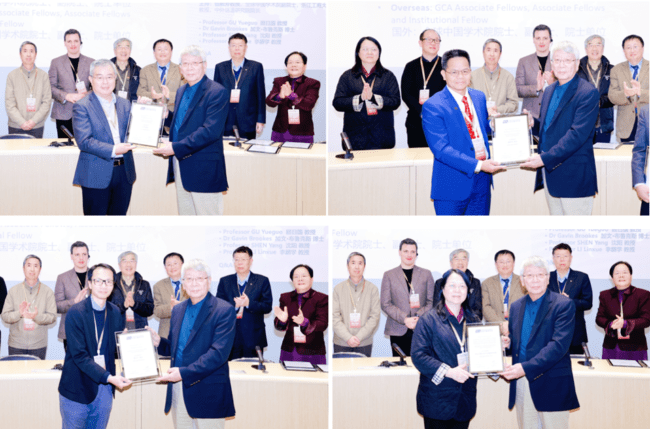
Presenter: Professor HAO Shiyuan FGCA, Academician and former Assistant President of the Chinese Academy of Social Sciences (CASS), presented Fellowship awards to the newly elected GCA Fellows, Associate Fellows and Institutional Fellow based in China, including Hong Kong.
Recipients:
- Professor LI Yang (top left), recipient of GCA Fellowship. He is Academician of the Chinese Academy of Social Sciences and Academician of the International Eurasian Academy of Sciences, as well as a former Vice President of the Chinese Academy of Social Sciences.
- Professor Shuhua Zhou (top right), recipient of GCA Fellowship. He is Chair Professor at City University of Hong Kong and a Fellow of the International Communication Association (ICA); former President of the Chinese Communication Association (CCA, 2017-2019) and Vice Chair of the Asia-Pacific Communication Alliance (ACPC, 2018-2025).
- Professor LI Boyi (bottom left), recipient of GCA Associate Fellowship. He is Secretary of the GCA Chinese Council, is a Professor of Management at the School of Business Administration, Nanjing University of Finance and Economics. He was formerly a Fellow in the Information Systems and Innovation Group at the London School of Economics and Political Science (LSE).
- Professor QIAN Yufang (bottom right) attended as a representative to receive the certificate for the GCA Institutional Fellowship, which she led. She is an Associate Fellow of the Global China Academy and a Professor at the School of Foreign Languages, Zhejiang Gongshang University. She is also the Director of the Institute of Corpus Linguistics and Discourse Studies (ICLDS), which has been recognized as an Institutional Fellow.
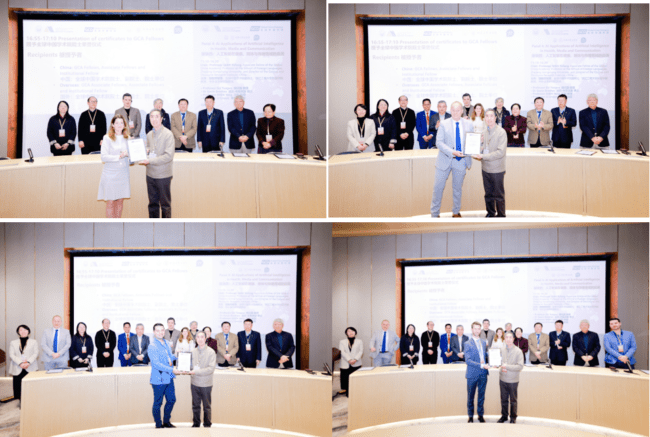
Presenter: Professor XIE Lizhong FGCA, Chinese President of the Global China Academy, former Head of the Department of Sociology at Peking University, and former Vice-President of the China Sociological Association (CSA), presented Fellowship awards to the newly elected GCA Fellows, Associate Fellows, and Institutional Fellows based overseas.
Recipients:
- Professor Madeline Carr (top left), recipient of GCA Fellowship, is Professor of Global Politics and Cybersecurity at University College London, as well as Co-Director of the interdisciplinary Centre for Doctoral Training in Cybersecurity and Deputy Director of the REPHRAIN Protecting Citizens Online research hub.
- Mr Ian Stafford (Top right), recipient of GCA Fellowship, is founder of the UK’s first internet sports magazine, Sportsvibe, and The Sporting Club. He is a multiple award-winning British sportswriter, journalist, and broadcaster, has published 23 books, with his works widely circulated not only in the UK but also in countries like the USA, Canada, Australia, and South Africa. He also attended as a representative to receive the certificate for the GCA Institutional Fellowship on behalf of The Sporting Club, which he founded.
- Dr Niall Curry FRSA SFHEA (bottom left), recipient of the GCA Associate Fellowship, Senior Lecturer in TESOL and Applied Linguistics within the Department of Languages, Information, and Communications at Manchester Metropolitan University, UK
- Mr. Ed Holroyd-Pearce (bottom right), recipient of the GCA Associate Fellowship, is the co-founder and president of Virtual Internships in the UK. He has a rich background in the intersections of education, technology, entrepreneurship, and Asia.
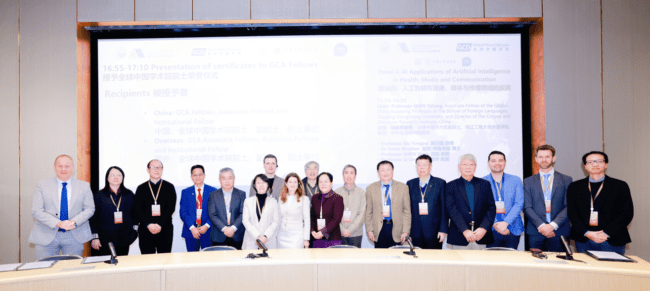
All the existing and newly awarded GCA Fellows, Associate Fellows, and representatives of Institutional Fellows gathered on the stage to celebrate their achievements and witness the formal conferral of honours, reinforcing the spirit of academic excellence and collaboration.
Presentation of the Young Scholars’ Paper Award
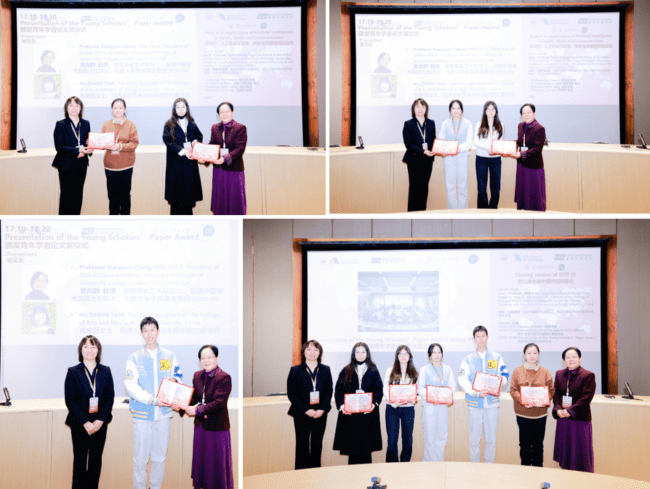
Presenters:
- Professor Xiangqun Chang (right) FRSA FGCA, President of Global China Academy; Honorary Professor of University College London (2015–20), UK
- Ms ZHANG Yanli (left), The Party Secretary of the College of Arts and Media at Tongji University, China
Recipients:
- The two Third Prize winners are on the left in the top left photo.
- The two Second Prize winners are on the right in the top right photo.
- The One First Prize winner is on the middle in the bottom left photo.
- The presenters with all the Prize winners in the bottom right photo.
For the first time, the Global China Dialogue (GCD) forums issued a call for papers to young scholars and awarded winners. All participants were invited to attend GCD9, and the winners were also invited to the dinner session. The selected papers are potentially to be published in relevant academic journals. This marks a significant step in fostering academic engagement, encouraging emerging researchers, and recognizing outstanding contributions in the field.

The photo above shows participants at the GCD9 venue.
Dinner: Celebrating the Newly Awarded GCA Fellowships and the Conclusion of the 9th Global China Dialogue at Kingswell Hotel Tongji(see a seperate webpage).
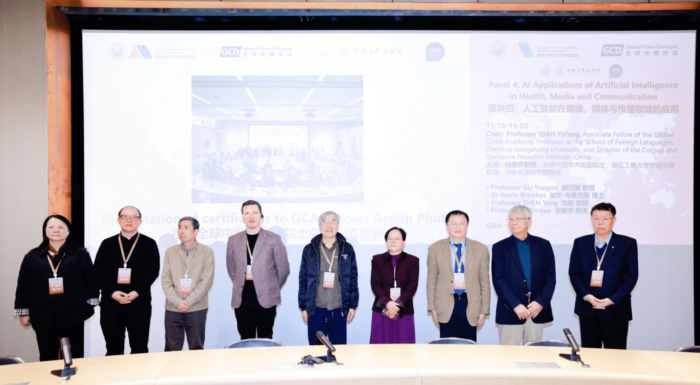
GCA Fellows Gathering at GCD9, Shanghai (November)
Global China Academy (GCA), the UK-based independent worldwide fellowship institution, is not generally recognized in China by the Chinese academia and public. Clarifications on GCA’s position and status were made before the 9th Global China Dialogue was held in China, entitled ‘Perceptions of Academician and Fellowship Systems in China and the International Context, and Their Chinese Translations‘.
In spite of this, GCA Fellows, Associate Fellows, and Representative Fellows in China have been very supportive and actively participated in our events, either in China or in the UK. For instance, on 17th September 2022, all GCA Fellows met online or in person in Beijing when GCA’s President, Professor Xiangqun Chang, visited China for the first time after COVID-19.
In 2024, the 9th Global China Dialogue Forum (GCD9) was planned to be held at Tongji University in Shanghai, marking the first time the event took place in China. All the GCA Fellows, Associate Fellows, and Representative Fellows in China responded positively and took on various roles at GCD9. They are listed below (in alphabetical order):
GCA Fellows:
- BING Zheng – Closing remarks
- Xiangqun Chang – Opening address and introduction at the GCA Fellows Awarding Ceremony
- GU Yueguo – Plenary speaker at Panel 4
- HAO Shiyuan – Presented Fellowship awards to the newly elected GCA Fellows, Associate Fellows, and Institutional Fellows based in China, including Hong Kong
- LI Linxue – Chaired the Opening session and plenary speaker at Panel 3
- Tony McEnery – Sourced relevant speakers and delivered the keynote speech (online)
- XIE Lizhong – Presented Fellowship awards to the newly elected GCA Fellows, Associate Fellows, and Institutional Fellows based overseas
- ZHANG Xiaodong – Plenary speaker at Panel 1
- ZHU Guanglei – Delivered a special speech at the Dinner session
GCA Associate Fellows:
- Gavin Brookes – Plenary speaker at Panel 4
- QIAN Yufang – Chaired Panel 4 and attended as a representative to receive the certificate for the GCA Institutional Fellowship
- WANG Xin – Co-organized GCD9 at Tongji University and chaired the Closing session
Institutional Fellows:
- College of Arts and Media at Tongji University (China) – Co-organizer
- Centre for Corpus Approaches to Social Science at Lancaster University (UK) – Co-organizer
- Global Century Press (UK) – Designed and produced all publicities
- Institute of Linguistics at Sun Yat-sen University (China) – Contributed a small donation
All Fellows, Associate Fellows, and representatives of Institutional Fellows were invited on stage during the Fellowship awarding ceremony at the Closing Session to witness the conferring of honours on the 2024 Fellows.
This page serves to highlight the invaluable contributions of the Global China Academy (GCA) Fellows, Associate Fellows, and Institutional Fellows to the success of the 9th Global China Dialogue Forum (GCD9). It recognizes the active participation of these individuals in various capacities, ranging from keynote speakers to session chairs, and acknowledges their dedication to advancing the GCA’s mission. The diversity of roles and the global representation of the Fellows demonstrate the broad and inclusive nature of GCA’s academic and professional community.
Furthermore, this page illustrates the collaborative spirit between GCA, academic institutions, and organizations from both China and the UK, showcasing the strength of partnerships that transcend borders. By sharing these highlights, the page not only reflects the achievements of the 9th Global China Dialogue but also reinforces the ongoing commitment of GCA members to fostering international dialogue, intellectual exchange, and cross-cultural understanding.
- Click here to visit the New Fellowships awarded in 2024
- Click here to visit the New Fellowships awarded in 2023
- Perceptions of Academician and Fellowship Systems in China and the International Context and their Chinese Translations.
- Click here to return to the Fellowship home page

GCA Formal Chinese President Professor ZHANG Letian Leads Academic Visit to the UK
In mid-November 2024, the Global China Academy (GCA) supported a nine-day academic visit to the United Kingdom by Professor Zhang Letian, founding Chinese President of GCA and Professor at Fudan University, together with his colleagues. Prior to the visit, Professor Zhang contacted GCA to request assistance in expanding the scope of his existing academic engagements and in enriching the overall itinerary. GCA subsequently participated in coordination and liaison work, helping to extend the original plan into a series of academic exchanges and institutional visits across London, Oxford, Lancaster, and Edinburgh, systematically strengthening collaboration between Chinese and UK universities in the fields of social sciences, digital humanities, and social life archives research.
Professor Zhang Letian is the founding Chinese President of the Global China Academy and a professor at Fudan University. The Contemporary Chinese Social Life Archive and the Global Alliance for Contemporary Social Life Archives, which he founded, are both housed within the Fudan University Library system. Accompanying him on this visit were two colleagues: Ms Yin Shenqin, Associate Director of the Institute of Humanities and Social Sciences Data at Fudan University and Deputy Director of the Shanghai Big Data Laboratory for Scientific Research; and Dr Wang Shunjing, Associate Professor at the Institute of Digital Humanities and Social Sciences, and Secretary-General of both the Contemporary Social Life Archive and the Global Alliance.

On 14 November, Professor Zhang attended the book launch of Integrity: The Rise of a Distinctive Western Idea and Its Destiny by renowned sociologist Professor Martin Albrow, former Honorary President of GCA, held at Hatchards Bookshop in London. Published by Polity Press, the book offers a historical and sociological examination of “integrity” as a core value of Western civilization, tracing its evolution from antiquity to the present and addressing its contemporary crisis in public life. The launch brought together scholars, publishers, and friends for a rich exchange on global ethics and social trust.
According to the planned schedule, Professor Zhang and his delegation attended the 8th UK–China Humanities Alliance for Higher Education Annual Conference (Worlds and World Views) at University College London (UCL) on 15–16 November, followed by academic exchanges in Oxford on 19–20 November.
With GCA’s coordination, the delegation also visited the Library of the Oxford China Centre, and, with arrangements made by its director Dr Mamtimyn Sunuodula, toured the Digital Library at the Bodleian Library and the Digital Collaborative Photography Centre. In addition, GCA facilitated academic exchanges with the Centre for Corpus-Based Social Science at Lancaster University and the Business School of the University of Edinburgh.

On 18 November, Professor Zhang and his colleagues visited the Global China Academy for formal exchange with the GCA team. The delegation toured the books and journals published by Global Century Press and held discussions with Professor Xiangqun Chang, President of GCA, and Mr Liu Daquan, Executive Manager of GCA.
During the meeting, Professor Zhang and Dr Wang Shunjing introduced the development and operational framework of the Global Alliance for Contemporary Social Life Archives. Initiated by Fudan University in 2016 and formally established in 2018, the Alliance is headquartered at the Fudan University Library and now brings together 34 university libraries and research institutions from East Asia and North America. It is dedicated to cross-media, interdisciplinary sharing of social life materials and international research collaboration. The Alliance has continuously supported international conferences and research projects, particularly in the areas of family studies, narrative history, and methodologies of social life archives.
At the conclusion of the exchange, the two institutions exchanged publications. As the visit took place near the end of the year, Professor Zhang’s delegation also brought silk-printed Spring Festival couplets as a gift to the GCA Fellows’ House. The couplets—symbolising scholarly continuity, diligence, and institutional well-being—became a warm and memorable moment of the visit.

The photo on the left shows a tea break during the academic meetings, where participants continued their conversations in a relaxed setting. The photo on the right captures a Chinese meal shared during the visit, where dining together extended the day’s discussions and strengthened mutual understanding through everyday social interaction, adding a human and cultural dimension to the academic exchange.

In keeping with GCA tradition, visiting scholars are invited to join a “walking dialogue”. During this visit, Professor Zhang and his colleagues participated in the sixth walking route, leading to Brocket Hall. Located in Hertfordshire, Brocket Hall is a historic estate of strong political symbolism, having once been the residence of two British Prime Ministers: Lord Melbourne and Lord Palmerston. In the mid-19th century, Palmerston played a key role in shaping Britain’s hardline China policy before and after the First Opium War—a conflict that profoundly altered China’s historical trajectory and reshaped the global order, while also influencing long-term Western political and cultural perceptions of China.
Situated along the River Lea, Brocket Hall combines classical architecture, landscape design, and waterways, forming a space where British political history and cultural landscape intersect. Today, the estate serves as a venue for international conferences and academic exchanges, carrying new public functions atop its historical foundations. GCA has long used this site as a node for academic visits and walking dialogues, transforming historical space into a platform for reflecting on global order, institutional change, and civilizational interaction.
In the final stage of the visit, scholars walked along the riverbank at Brocket Hall, continuing the day’s academic conversations through movement and dialogue. During a brief ferry crossing, the group collectively experienced the transition from sunset to nightfall. The fading light, shifting space, and uninterrupted conversation intertwined, allowing academic exchange to momentarily leave the conference room and become a situated, embodied, and shared experience.
This moment carried deep symbolic meaning: in a space once deeply entangled in the formation of global inequality and China’s modern historical fate, researchers from different academic traditions walked side by side as equals. Through slow movement and open conversation, they revisited questions of society, memory, archives, and time. Academic exchange thus gained a different rhythm and depth, endowing contemporary Sino–British collaboration with a transcultural dimension—where knowledge was not merely discussed, but re-produced and re-connected through shared experience.

GCA Founding and Past Honorary President Professor Martin Albrow Launches New Book Integrity
On 14 November 2014, Professor Martin Albrow, Founding and Past Honorary President of the Global China Academy (GCA), launched his new book Integrity: The Rise of a Distinctive Western Idea and Its Destiny at Hatchards, London. Published by Polity, the book offers a profound historical and sociological exploration of integrity as a defining value of Western civilization and its relevance in contemporary public life.
In the book, Albrow traces the idea of integrity from its origins in ancient Greece and Rome—where it signified unity through values and adherence to external standards—through Christianity, the Renaissance, and into the modern era. He argues that today’s public life is marked by a troubling paradox: while integrity is widely demanded, political leaders can often succeed without embodying it, creating what he terms a new “politics of the integrity vacuum.”
Albrow concludes that although integrity emerged as a distinctive Western concept, it has become a shared global concern. He calls for a renewal of integrity through dialogue with non-Western wisdom, emphasizing the need to rebuild honesty, trust, and reliability in public and social life. The launch event at Hatchards brought together scholars, publishers, and friends to celebrate a work that speaks directly to some of the most pressing ethical and political challenges of our time.


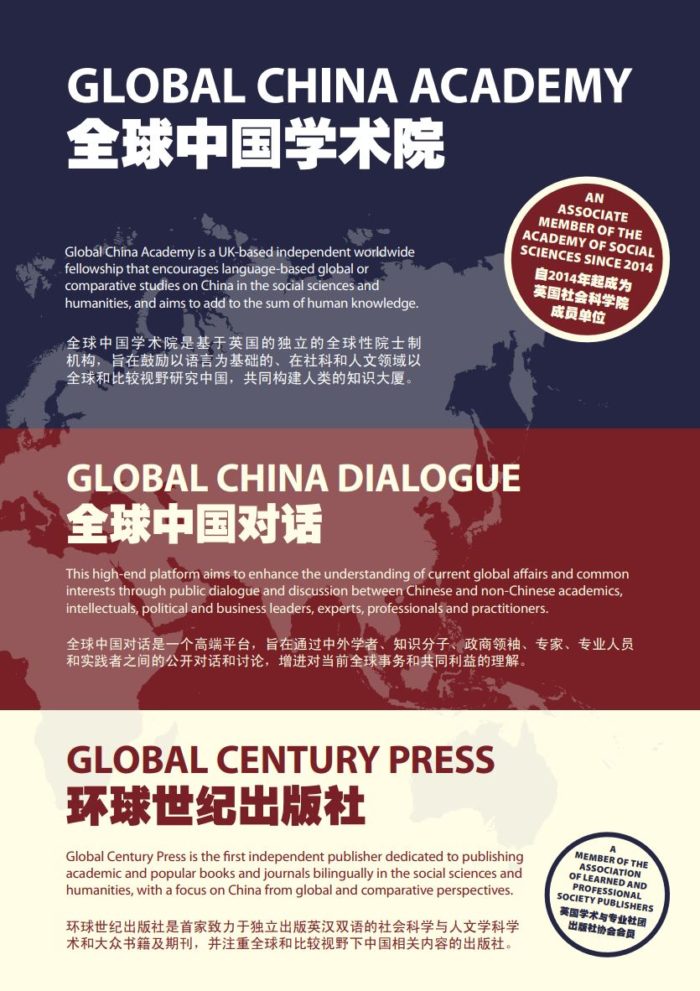
A Decade of Achievement: Associate Member of the Academy of Social Sciences Since 2014
After celebrating the 10th anniversary of the founding of the Global China Academy (formerly CCPN Global and Global China Institute, 2013–2023), we have entered phase 2.0 starting in 2024. This also marks the 10th anniversary of becoming an Associate Member of the Academy of Social Sciences in 2014. We have updated brochures available in either A4 portrait or A5 landscape sizes in both English and Chinese. They include the following information:
Global China Academy: An Introduction

About Global China academy
Global China Academy (GCA) is a UK-based independent worldwide fellowship that encourages comprehensive studies on China in the social sciences and humanities. Taking language-based global or comparative perspectives, it aims to add to the sum of human knowledge. It also encourages participation in global society building and governance. All of this is achieved through the dissemination of academic research, knowledge transfer, social consultancy and public engagement.
- Our publishing subsidiary, Global Century Press (GCP, UK Company No.: 08892970) is the first independent publisher dedicated to publishing academic and popular books and journals bilingually in the social sciences and humanities, with a focus on China from global and comparative perspectives.
- The Global China Dialogue (GCD) series is a high-end discourse platform facilitating communication between the Chinese and the rest of the world.
Board of Trustees
GCA was formerly known as CCPN Global, founded in 2013 (Charity No. 1154640), and later as the Global China Academy (GCA). As a UK Charitable Incorporated Organisation (CIO, Charity No. 1198983), GCA is governed by a Board of Trustees consisting of the Chair (Maria Jaschok), Secretary, Treasurer, and members, who are responsible for running the organisation in accordance with charity law and our constitution. They also provide strategic oversight of the organisation, including taking the lead in implementing appropriate actions if any risks should occur.
GCA Council
The GCA Council is composed of prominent individuals who have a keen interest in the study of China and the Chinese in a global context. The Council plays a vital role in advising and guiding the Academy’s development and beyond. It is active in a range of other ways, including the recruitment of new Fellows, contribution of articles to our journals, recommendation and submission of books for publication by Global Century Press, recommendation of themes and speakers for our Global China Dialogues, and in raising the Academy’s profile around the world.
- Council Chair Prof Tony McEnery FAcSS FRSA FGCA, Lancaster University, UK
- Chinese Council Chair: Prof BING Zheng FGCA, Jilin University,
China - Non-Executive Chair, Prof Wei Li FBA FAcSS FRSA FGCA, IOE of University College London, UK
- Chinese Non-Executive Chair, Prof ZHANG Xiaodong FGCA, CEO of Agile Think Tank and Nanjing University of Finance & Economics, China
- President: Prof Xiangqun Chang FRSA FGCA, Global China Academy, UK
- Chinese President: Prof XIE Lizhong FGCA, Peking Uinversity, China
- Vice-President (Fellowship), Prof Peter Schröder, University College London, UK
- Vice-President (Publications), Prof Qing Cao, Durham University, UK
- Vice-President (Asian engagement), Prof Shigeto Sonoda, University of Tokyo, Japan
- Vice-President (European engagement), Prof Carsten Herrmann-Pillath, Erfurt University, Germany
- Secretary (UK): Dr Yan Wu, Swansea University, UK
- Secretary (China): Prof. LI Boyi, Nanjing University of Finance and Economics, China
- The administrative team consists of the Legal Advisor, Events Officer, Administrative Manager, Project Manager, and Operations Manager.
- Founding and Past Honorary President (2013–2021): Prof. Martin Albrow FAcSS.
- Founding and Past Chinese President (2013–2017): Prof. ZHANG Letian.
Global China Academy Fellowship

Types of fellowship
- Founding Fellows and Life Fellows were granted by Global China Academy’s founding Honorary Presidents (UK and China), Presidents (UK and China), and the Board of Trustees at the founding of the Global China Academy in 2021.
- Full Fellows are distinguished scholars, academics and professionals whose expertise and knowledge provide GCA with access to the best possible advice and guidance. They also contribute to the publications of Global Century Press and the Global China Dialogue series of forums.
- Associate Fellows are typically early to mid-career scholars, academics and professionals who have demonstrated potential in their field but may not yet have the extensive accomplishments or tenure of a Full Fellow. They often collaborate on research projects, contribute to publications and may participate in dialogues or forums.
- Institutional Fellows are organizations that share our academic and social missions and support the work of Global China Academy, Global Century Press and the Global China Dialogue series forums.
Eligibility criteria
Full Fellowship
- Has made a significant contribution to advancing the understanding or promotion of studies on China and the Chinese with global or comparative perspectives in the social sciences and humanities.
- Has an established track record of participating in transcultural initiatives, fostering dialogue and engaging with the governance of global society.
- Has shown leadership, innovation and influence in the above-named fields.
- Has clearly demonstrated ethical and moral integrity that aligns with the values of the GCA.
Associate Fellowship
- Aged 21 or over, and based in the UK or overseas.
- Has demonstrated an interest in the understanding or promotion of studies on China and the Chinese with global or comparative perspectives in the social sciences and humanities through research, teaching, training, professional work, publications or other similar work.
- Has demonstrated potential in their field, although they may not yet have attained extensive accomplishments and hence are not ready for Full Fellowship.
Institutional Fellowship
- The institution shares Global China Academy’s academic and social missions.
- The institution supports the work of Global China Academy, Global Century Press and the Global China Dialogues.
How to Apply
Before submitting a proposal please download the following information from the webpage https://globalchinaacademy.org/fellow-ship-nominations:
More Information
Please visit www.globalchinaacademy.org/gca-fellowship for more information:
- Fellowship Lists
- Fellowship Benefits and Obligations (English and Chinese)
- Fellowship Subscriptions
- Support us
Global China Dialogue and Other events
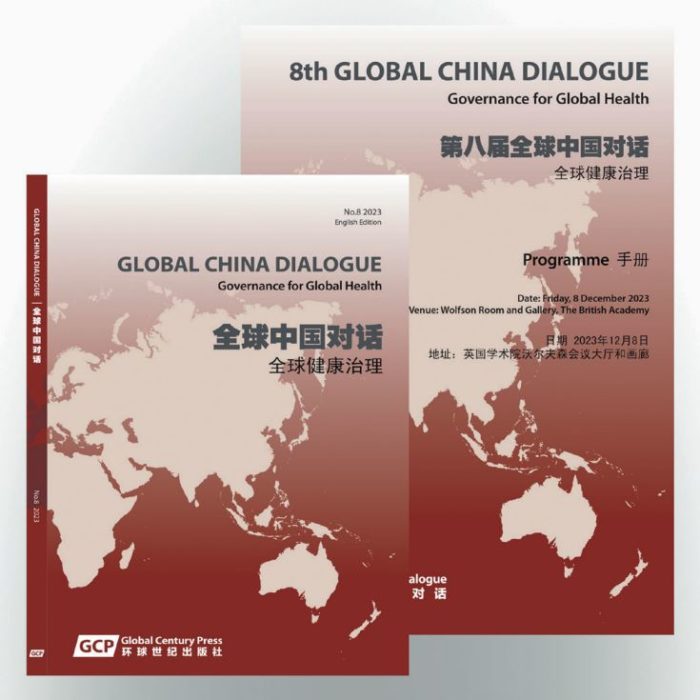
About the Global China dialogues
The annual Global China Dialogue (GCD) forum is a core event held by Global China Academy in collaboration with various organisations. The GCD is a high-end forum that focuses on ‘transculturality’ and social creativity. Our aim is to enhance public understanding of current global affairs and common interests. We do this via public dialogue and discussion between Chinese and non-Chinese academics, political and business leaders, experts, professionals, practitioners and interested laypeople. Our approach is interdisciplinary and comparative.
Based on GCDs rules of ‘civilized dialogue’, we encourage both sides to listen to the other, understand cultural differences, respect local customs, accept different perspectives and acknowledge the common humanity. In particular, it explores new global governance, encompassing national governments, international organizations, multinational companies, NGOs and citizens, with a mission to build a harmonious, symbiosis-based human community of a shared future.
Past and future dialogues as are follows:
- 2025 GCD X: Governance for Global Education
- 2024 GCD IX: Global Governance for AI
- 2023 GCD VIII: Governance for Global Health
- 2021 GCD VII: Reforming Global Governance
- 2019 GCD VI: Governance for World Peace
- 2018 GCD V: Governance for Global Justice
- 2017 GCD IV: The Belt and Road (B&R) – Transcultural Cooperation for Shared Goals
- 2016 GCD III: Sustainability and Global Governance for Climate Change
- 2015 GCD II: Transculturality and New Global Governance
- 2014 GCD I: The Experience of China’s Modernization from a Comparative Perspective
Other events

Global China Academy organizes and participates in activities relating to China in comparative perspective and social sciences and humanities studies on China, and in activities of a different nature that chime with its academic and social missions.
- 2020 A Symposium on China’s Development Path in the New Era from Multiple Perspectives
- 2019 Global China Media Seminar series (2016–19, UK)
- 2018 Academic Publishing and Knowledge Service Conference
- 2018 Digital Interconnection and Intelligent Manufacturing: Social Change and Cultural Transformation in Global Society
- 2017 Chinese for Social Science (CSS) Workshop
- 2017 Globalization of Chinese Social Sciences Symposium
- 2017 Global China Media in Comparative Perspective Symposium
- 2017 Forum Series on Transcultural Cooperation and New Methodologies for Social Sciences
- 2016 Corpus Approaches to Chinese Social Science (CACSS) Workshop
- 2014 A symposium on China-British Cultural Exchange: Strategic Cooperation and Practical Implementation
- 2013 Max Weber and China conference
- 2013 How do Migrants from the BRICS Countries Participate in Shaping the Global Society?
Global Century Press
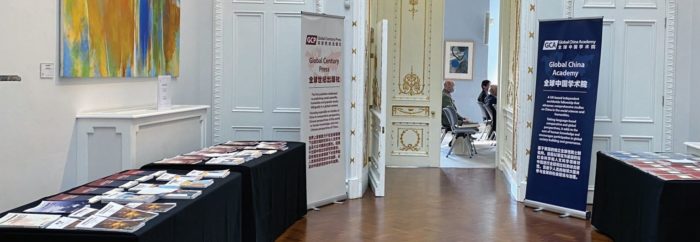
About Global Century Press
Founded in 2014, Global Century Press (GCP, UK Company No.: 08892970) is the first independent publisher dedicated to publishing academic and popular books and journals bilingually in the social sciences and humanities, with a focus on China from global and comparative perspectives.
GCP publishes a range of publications, from academic journals, edit ed volumes, selected conference papers and theme-based articles, to research monographs, book series, teaching and learning materials on Chinese for social sciences and reference books, printed mostly in colour. Works are published in various forms, such as print, electronic versions, video, audio, on the internet and the mobile internet. A subsidiary company of the Global China Academy, GCP’s bilingual publications serve the purposes of disseminating related academic research, knowledge transfer and public education globally.
Open access journals and books
Under its open access model, GCP makes 80 percent of its journal and book content freely available to the public, promoting academic exchange and knowledge sharing. This means that readers can freely access and download certain articles or portions of the journal’s content, without any payment or subscription required. At the same time, GCP also offers a subscription model, providing readers who need it with wider access and services. Through subscription, readers can gain access to the full content of the journal, special features or additional resources, as well as other benefits exclusive to subscribers.
House Style Guide
GCP House Style Guide can be downloaded in our website. It is designed to take our contributors’ work from initial manuscript to final publication with a minimum of fuss. Our style broadly follows APA 7th edition but has evolved over time through our growing experience of dual language editing and typesetting.
Dual languages
GCP is pioneering a unique approach to integrating English and Chinese in its publications. Its dual language styles and rules have been developed with both English and Chinese academics, graphic designers, editors and proofreaders. GCP applies this house style to all journals and books. GCP has DOI authorization. Any single article with a DOI number. Additional dual language information is displayed at the end of each book, a feature unique to GCP. Additional dual language information is displayed at the end of each book, a feature unique to GCP.
Publisher’s Professional Team
- President: Ingrid Cranfield
- Editor-in-Chief: Xiangqun Chang
- Professional Team consists of Academic Advisor, Senior Associate Editor, Editors, Proofreaders, Translators, Graphic Designers, Typesetters, Librarian, Website Engineers, etc.
Publication events
Please visit GCP website for publication-related events: https://globalcenturypress.com/events.
Journals
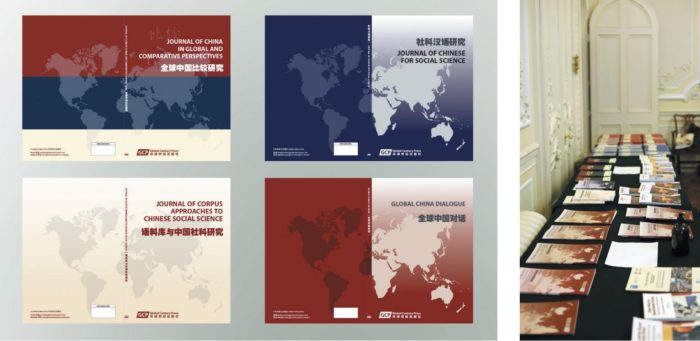
Global Century Press (GCP) publishes three cutting edge academic journals. They are Journal of China in Global and Comparative Perspectives (English and Chinese editions), Journal of Chinese for Social Science (Chinese edition), and Journal of Corpus Approaches to Chinese Social Science (Chinese and English editions). GCP also publishes the ‘Global China Dialogue Proceeding’ series in English and Chinese editions.
- Journal of China in Global and Comparative Perspectives (JCGCP). CGCP launched in 2015 (annually), publishes original multidisciplinary and interdisciplinary comparative research on China on a range of topics in the social and human sciences. Beyond purely academic content it appeals to policymakers and general readers interested in China. Its aim is to bring out the best in scholarship, transcending traditional academic boundaries in an innovative manner.
- Journal of Chinese for social science (JCSS). JCSS formally launched in 2021 (biennially), Formally launched in 2021, JCSS scrutinizes the utilization of the Chinese language in academic contexts, emphasizing the crucial role of precise translation and the issues arising from cross-lingual research in Chinese social sciences. It minimizes risks related to translation in cross-cultural research, and enhances dialogue among various languages, cultures, and communities. JCSS’s commitment to accurate translation forms the backbone of effective intercultural communication, ensuring contextual clarity and contributing to the global exchange of social science knowledge and ideas.
- Journal of Corpus Approaches to Chinese Social Sciences (JCAC SS) launched in 2019 (annually in Chinese and English alternatively), is guided by the founding Director of the ESRC Centre for Corpus Approaches to Social Sciences at Lancaster University, Professor Tony McEnery, and supported by colleagues both domestically and abroad. It introduces innovative corpus methods to the Chinese social sciences field. It addresses challenges in this domain, offers a platform for academic exchange, and publishes pertinent research in the context of big data and the complexities of the global digital age.
- Global China dialogue Proceedings. The Global China Dialogue forums aim to enhance the understanding of current global affairs and common interests through public dialogue and discussion, using interdisciplinary and comparative perspectives. Each issue of the Global China Dialogue Proceedings includes information on the chairs and speakers, topics and abstracts, and content of speeches and Q&A sessions. It also includes photos of the panels, participants, discussions, and networking. It is hoped that this combination of images and text can preserve the dynamic dialogue for interested readers whether or not they participated in the forums.
Book sciences
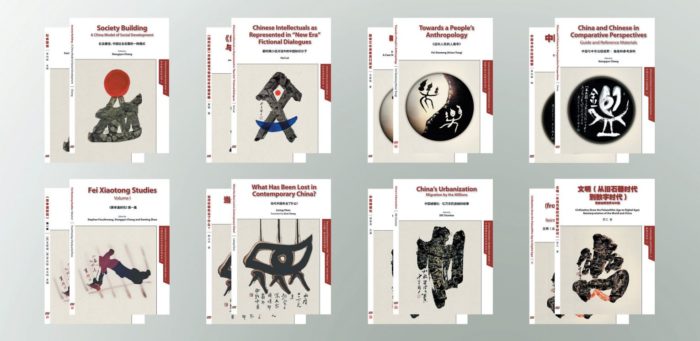
GCP publishes eight book series on specific themes. They are:
- Chinese Concepts aims to infuse Western social science concepts with uniquely Chinese elements. By revisiting terms such as ‘bao’ (reciprocation), ‘mianzi’ (face), and ‘guanxi’ (reciprocity or deferential relationship), the series enhances the world’s knowledge system by incorporating diverse cultural insights into traditional social science disciplines.
- Chinese Discourse covers discourse studies around Chinese history, culture, current affairs, language and people. It advocates an interdisciplinary, multi-perspective, multi-method knowledge merged with Chinese culture and possessing a global outlook, which bridges the gap between China and the rest of the world and opens a window for the outside world to understand China.
- Understanding China and the World was inspired by a significant 2010 event, ‘Understanding China, Engaging with Chinese People’, commemorating the centenary of renowned sociologist Fei Xiaotong’s birth. The series delves into comprehensive understanding and rational interpretations of China and the world, echoing the multi-dimensional insights from the event.
- China and Chinese in Comparative Perspectives expands the aims of Journal of China in Global and Comparative Perspectives to include Chinese ways of thinking, Chinese people, civilization, and culture, and contrasts between China and elsewhere, Chinese people and non-Chinese people, Chinese perspectives of the world, and non-Chinese perspectives of China globally.
- Globalization of Chinese Social Sciences aims to globally promote prominent Chinese social scientific works and a century’s efforts by social scientists both inside and outside China.
- Transcultural Experiences with ‘Three Eyes’ acts as a bridge in the areas of cross-border cultural communication and mutual understanding. Authors examine their understanding of Chinese culture, non-Chinese cultures, and their specialties and sectors as professionals and practitioners. This ‘triple perspective’ describes and explains the collision and confluence between different cultures and notions they experience in their everyday lives and work in China and abroad.
- China Urbanization studies explores the delay in people’s urbanization in China, highlighting the disparity between migrant workers and urban residents. It underscores China’s commitment to addressing these issues with sustainable, people-oriented policies.
- Cutting Edge and Frontiers provides a platform for readers to explore and understand the forefront of research and development across various fields, offering insights into the most advanced social scientific topics globally.

